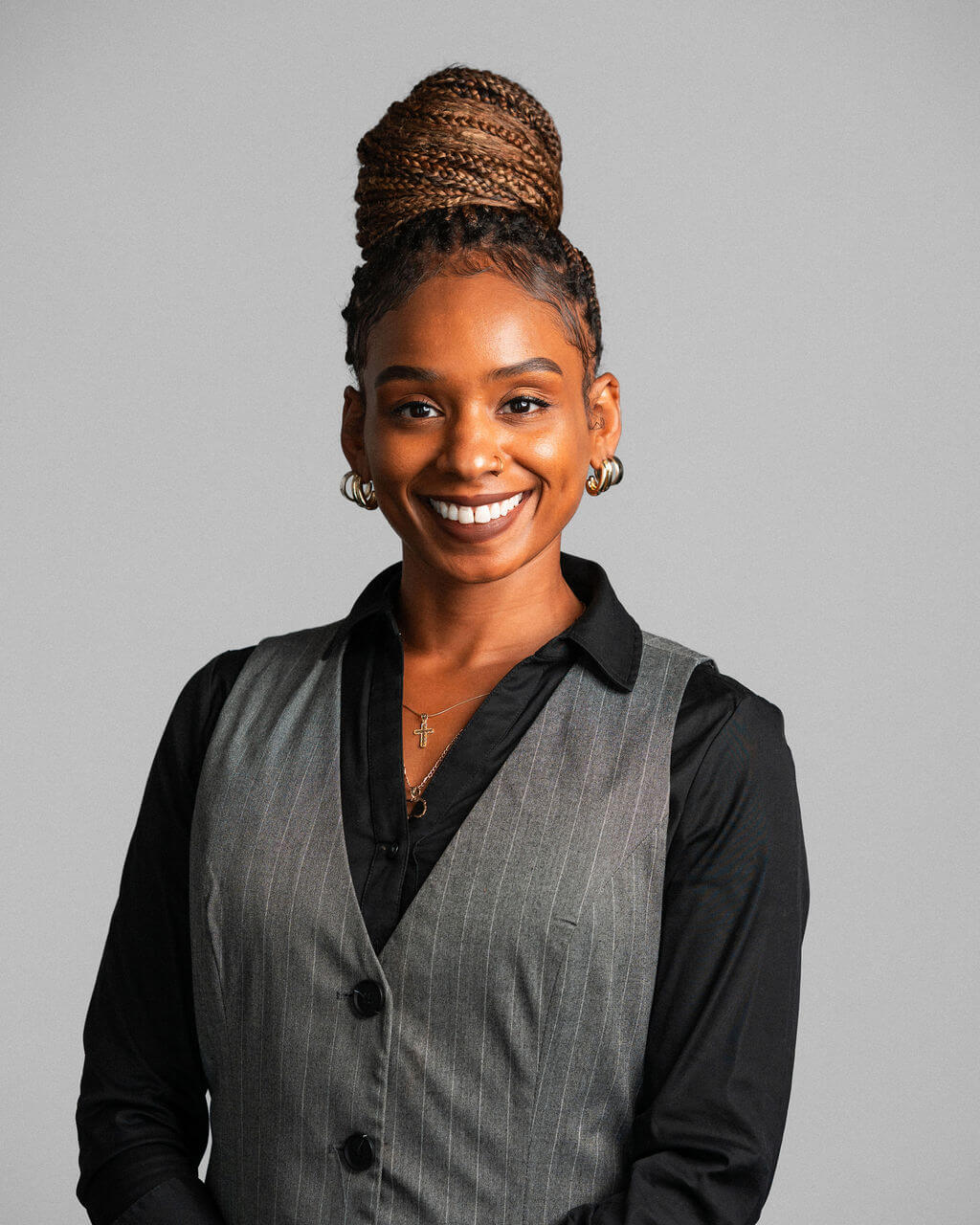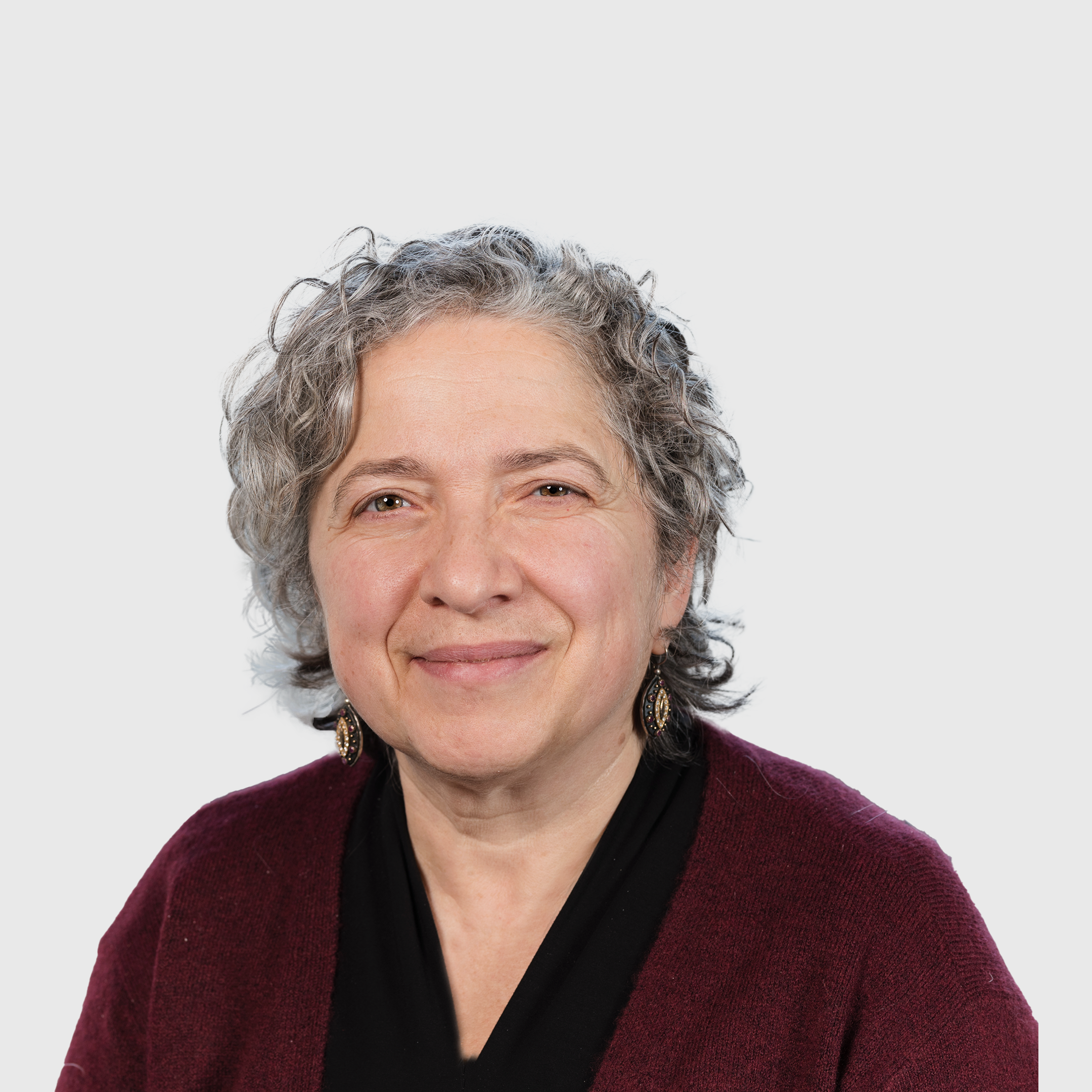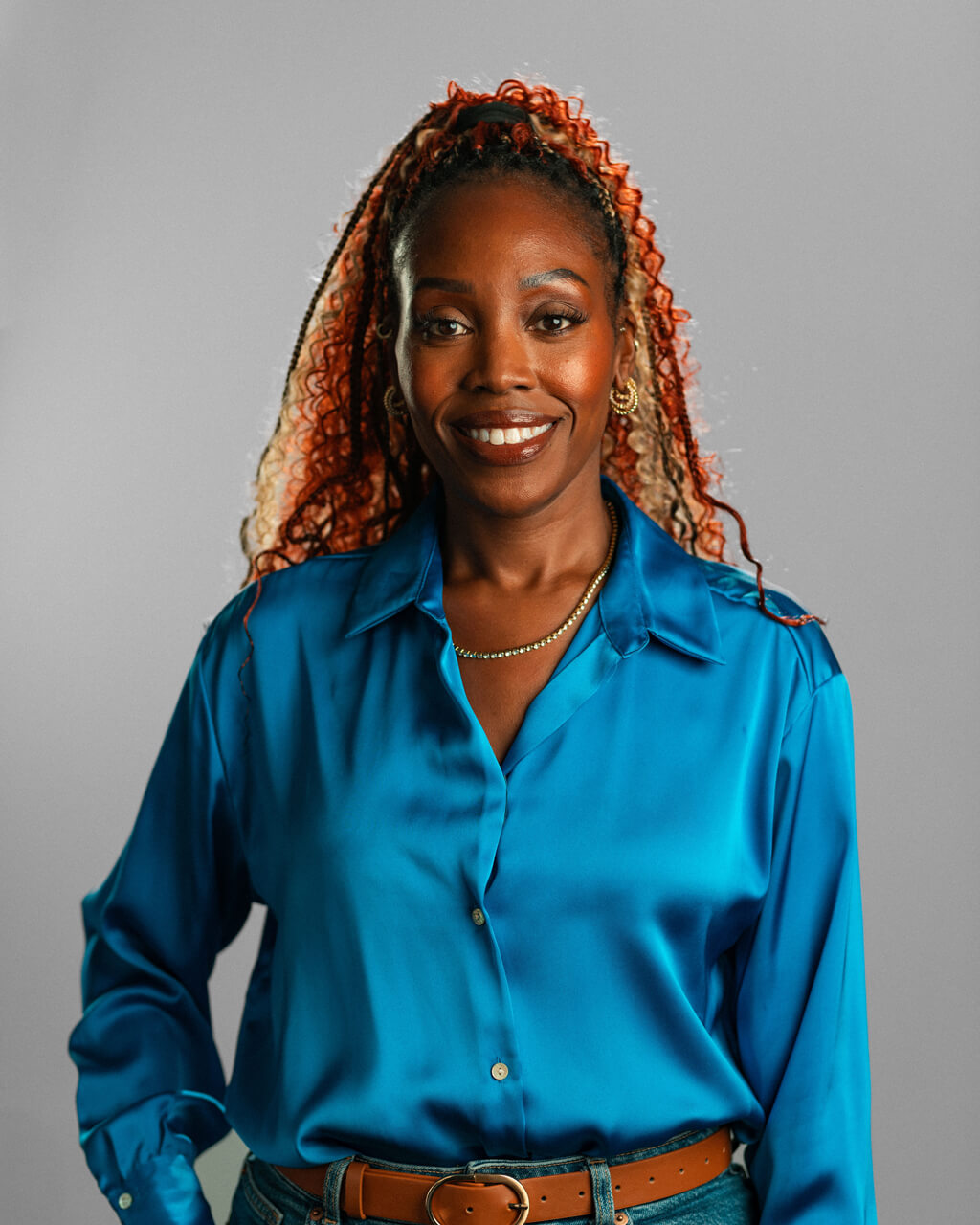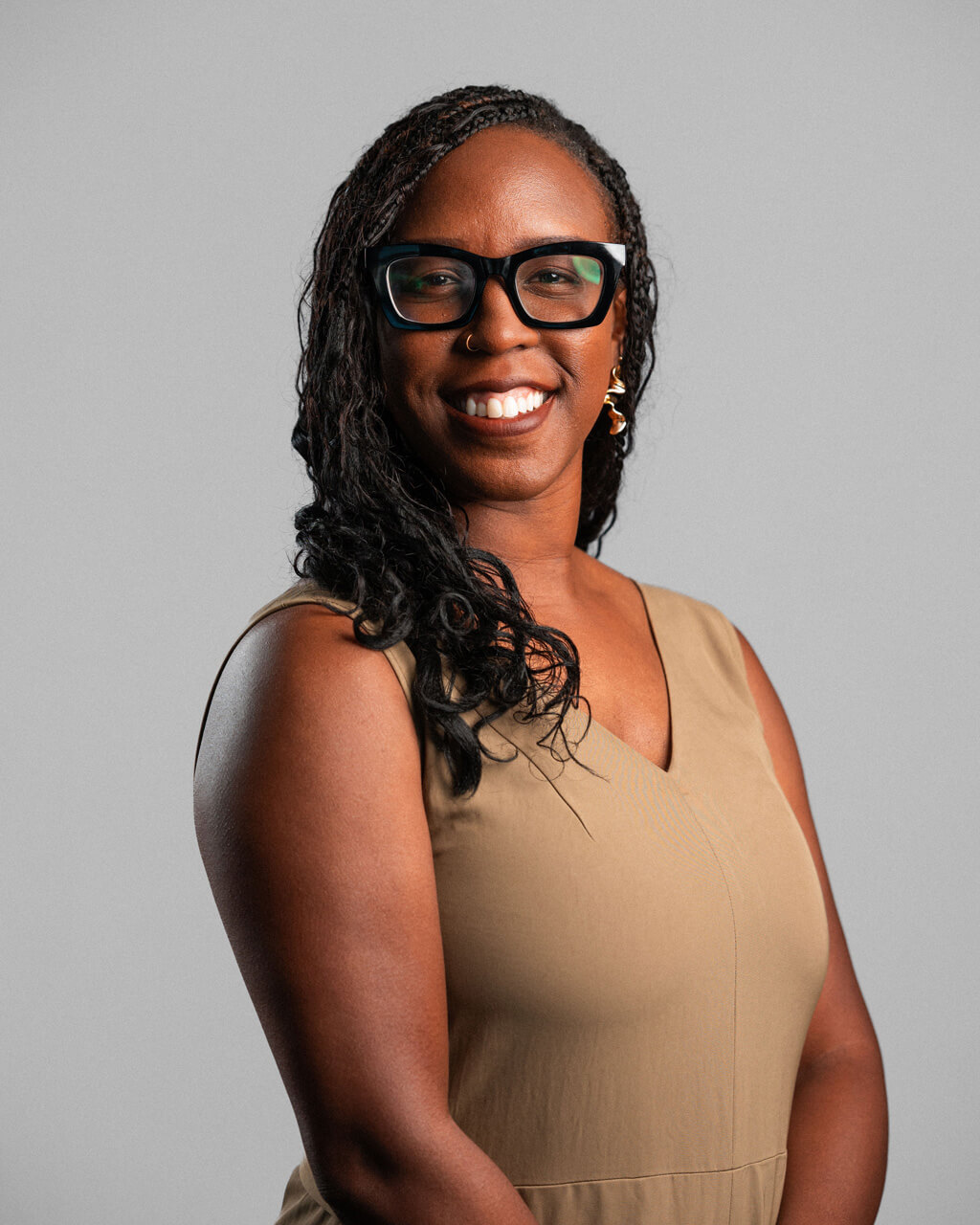
Master of Arts (M.A.) in Couple + Family Therapy
Chicago
The Adler University Master of Arts in Couple and Family Therapy combines evidence-based coursework with supervised practice, preparing practitioners to help couples and families navigate complex challenges.
- 60 credits
- 2-year program, full time
- COAMFTE accredited
- AAMFT Approved Supervisors
- Stackable certificate options
- Pathway to doctorate
Admission Deadlines
| Term | Priority | Final |
|---|---|---|
| Fall 2026 | 12/1/2025 | 2/15/2026 |
Program overview
Couples and families face challenges that ripple across communities, and the Adler University Master of Arts in Couple and Family Therapy prepares students to address them directly. The program blends systemic coursework with intensive clinical experience, helping students build the insight, cultural responsiveness, and practical skills needed to begin professional practice.
From the very first term, classroom learning is connected to meaningful work in the community. Students engage in self-of-the-therapist development — a process that emphasizes reflective practice, group dialogue, and clinical practicum supervision to explore how their own relational history and emotional resilience shape their work. Alongside individualized advising, mentorship, and wellness resources, these experiences build both professional competence and personal awareness, preparing students to enter practicum placements with confidence and care.
These experiential opportunities, tailored to professional interests, provide a strong foundation in assessment, treatment planning, and systemic intervention, ensuring graduates are prepared for licensure and practice.
Why choose the master’s in couple and family therapy program at Adler?
- Standard of excellence: Accredited by the Commission on Accreditation for Marriage and Family Therapy Education (COAMFTE), the program provides training that meets nationally recognized academic and clinical standards.
- Applied focus: Coursework integrates systemic theory with applied skill development, bridging the gap between the classroom and the therapy room.
- Mentorship and growth: Receive personalized mentorship in systemic practice from faculty who are both licensed marriage and family therapists and AAMFT Approved Supervisors.
- Community-based practicum: Field placements offer real-world experience working directly with couples and families while building clinical confidence and competence.
- Pathway to doctoral study: Students interested in advanced research and leadership can continue into Adler’s COAMFTE-accredited Ph.D. in couple and family therapy.
AccreditatiON
Accreditation
Our Ph.D. in Couple and Family Therapy is the only Ph.D. program in Illinois that is accredited by the Commission on Accreditation for Marriage and Family Therapy Education (COAMFTE). Our program prepares recent graduates of clinical master degree programs and experienced clinicians to be advanced practitioners in couple, marriage, and family therapy as well as leaders in research, teaching, and advocacy.
The Ph.D. in Couple and Family Therapy Program at Adler University is accredited by the Commission on Accreditation for Marriage and Family Therapy Education (COAMFTE), 277 S.Washington Street, Suite 210, Alexandria, Virginia 22314, (703) 838-9808, coa@aamft.org.
The program is currently accredited for the period of 5/1/2023 through 5/1/2028.
View the Certificate of Accreditation for the Couple and Family Therapy program
Licensure
Adler University works to provide resources to our students and alumni in support of the licensure process. Please review this information thoroughly. If you require more detailed, step-by-step instructions, please submit an email to the Alumni Relations Office with the subject line: “ALMFT/LMFT Licensure Application Process guidelines” and request instructions.
Licensed Marriage and Family Therapist
This program’s sequence of courses and supervised clinical training are intended to assist professionals in meeting the educational requirements for licensure as a Marriage and Family Therapists (LMFT) in Illinois.
LMFT requirements vary by state. Through individualized advising, students will work with our faculty to plan their curriculum in order to meet the criteria for the specific state/s where they intend to practice. As the program is COAMFTE-accredited, it also improves students’ portability of their degree for licensure.
LMFT Licensure in Illinois
The curriculum and supervised training of the MCFT program are intended to help graduates meet the educational requirements for licensure as a Marriage and Family Therapist (LMFT) in the state of Illinois. Licensure requirements can vary significantly from state to state in their expectations of practicum hours and coursework. Students are strongly encouraged to review the licensing requirements in any state in which they would anticipate practicing. MCFT students complete a practicum as part of their degree requirement including 100 hours of supervision with an AAMFT Approved Supervisor or Supervisor Candidate. This 100 hours of supervision can also be used towards LMFT licensure requirements in the state of Illinois. Additionally, the Master’s Qualifying Exam for degree completion is intended to prepare students for the licensure exam.
Doctoral students in Couple and Family Therapy (DCFT) must be licensed or eligible for licensure as a LMFT in the state of Illinois. Applicants without this can be admitted as a doctoral student but must first complete the requisite coursework for eligibility – this will be determined on a case-by-case basis by the Department Chair. Students not meeting this requirement will take the requisite CFT courses in the first year of their doctoral program. Client contact (practicum and internship) and supervision, done post the eligible master’s degree, to fulfill the doctoral requirements can be counted as hours towards licensure should it meet all the state and program requirements.
Information regarding licensure as an LMFT in the state of Illinois can be found at the Illinois Department of Financial and Professional Regulations website for Marriage and Family Therapy.
Information regarding the licensing exam can be found at the Association of Marital and Family Therapy Regulatory Boards National Exam. *log in is required
Expand Your Credentials
Adler University provides students with options to customize their education through dual degrees, certificates, and program emphases.
Students enrolled in the master’s of couple and family therapy can strengthen their professional preparation through optional certificates in Sex Therapy or Substance Abuse Counseling.
Adler University offers a Certificate in Sex Therapy to both current students and non-degree learners through a 10-credit hour program delivered in a blended format.
The certificate is approved by the American Association of Sexuality Educators, Counselors, and Therapists (AASECT) and fulfills the educational requirements toward AASECT Certified Sex Therapist designation. Completion of the program provides the academic foundation for certification; additional clinical hours and supervision are required to achieve credentialing.
Coursework integrates advanced knowledge in human sexuality, sex therapy approaches, and sexual attitude reassessment (SAR). Learning combines online modules with weekend intensives at Adler’s Chicago campus, ensuring both flexibility and meaningful applied preparation for professional practice.
Adler University offers a Substance Abuse Counseling Certificate to students in select Chicago programs through an additional 12 credit hours.
The certificate is accredited as an Advanced Alcohol and Other Drug Abuse Counselor Training Program by the Illinois Alcohol and Other Drug Abuse Professional Certification Association, Inc. (IAODAPCA), following the Illinois Model for Certification of Alcohol and Other Drug Abuse Counselors.
Coursework covers the theories, techniques, and core functions of substance abuse counseling, with an emphasis on evidence-based research and best practice standards. A specialized practicum experience further enhances applied skills and professional preparation.
Careers paths that Change lives, families, and communities
Graduates of Adler University’s Master of Arts in Couple and Family Therapy are ready to do more than enter the workforce — they step into roles that transform relationships, strengthen families, and improve systems of care.

Marriage + Family Therapist
Provide therapy to couples and families navigating relational challenges, life transitions, and mental health concerns. These clinicians use systemic approaches to strengthen communication, foster resilience, and support lasting change in relationships.

Child + Adolescent Therapist
Specialize in working with children and teens facing emotional, behavioral, or developmental challenges. By collaborating with families, schools, and communities, these therapists help young people build coping skills and promote healthy development.
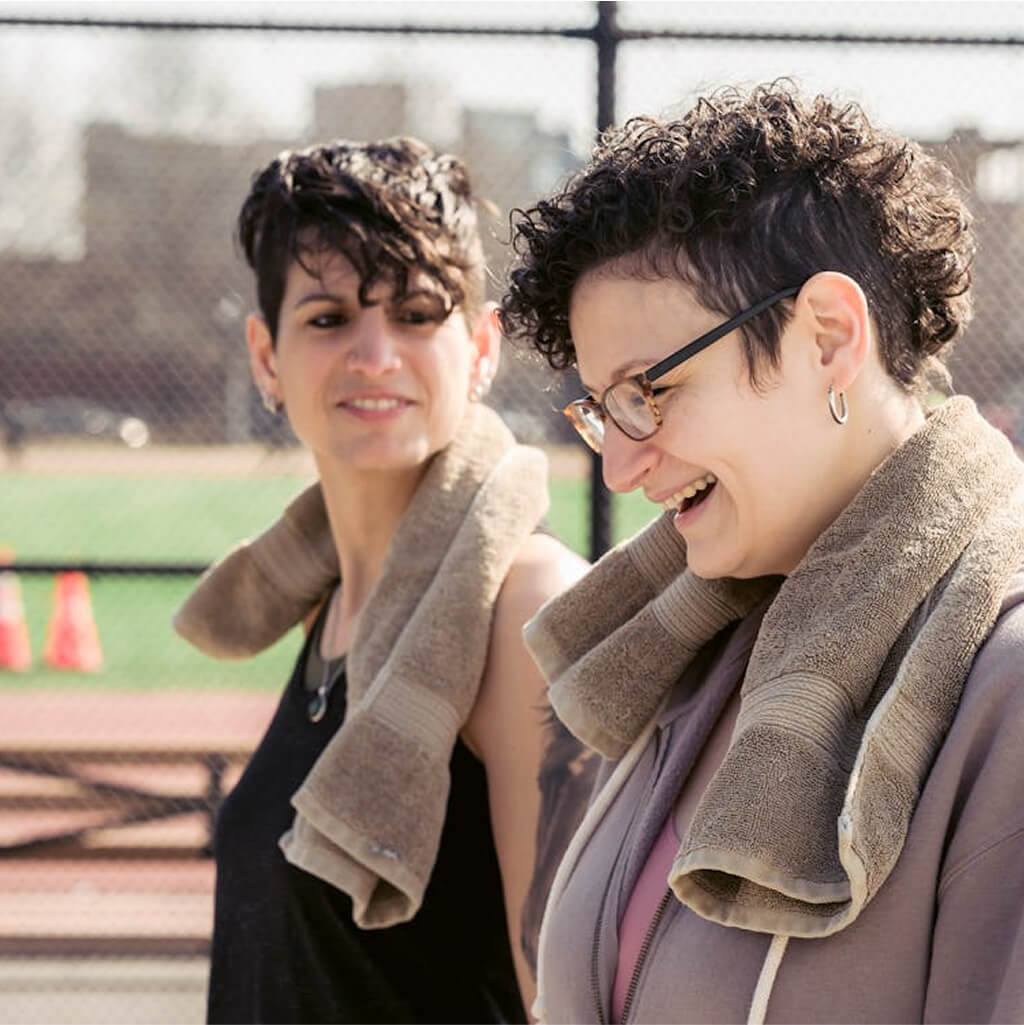
School-Based Therapist
Deliver therapeutic services directly within schools, partnering with educators and administrators to support student well-being. These roles address issues such as anxiety, bullying, or family stress that impact learning and classroom engagement.

Private Practice Therapist
Build an independent practice providing therapy tailored to diverse clients and presenting concerns. Private practitioners have flexibility in the populations they serve and the approaches they integrate into their work.

Social Service Agency Therapist
Partner with community-based or government agencies to provide therapy for underserved populations. These therapists often support families experiencing poverty, housing insecurity, or systemic barriers to care.
Admission requirements
Eligibility
Applicants of this program must meet the following requirements:
- A baccalaureate degree earned from a regionally accredited college or university or an equivalent degree from an international college or university.
- A recommended GPA of 3.0 or higher on a 4.0 scale for undergraduate and graduate coursework. Exceptions may be made for applicants who demonstrate outstanding academic performance or academic ability in other ways.
Application Requirements
Applicants are required to submit the following items to be considered for admission:
- Application fee.
- Completed application submitted via the online portal.
- Resume or Curriculum Vitae.
- Statement of Intent.
- Transcripts from all undergraduate and graduate schools attended (U.S and Canada). Officials required to remain enrolled.
- Two letters of recommendation. These should be from someone who can specifically speak to your academic and professional abilities and include at least one from a graduate instructor and one from a clinical supervisor.
- Faculty interview
Statement of Intent
Applicants are required to provide a statement of intent answering the following questions. They should be 2-3 pages, double-spaced.
- Why are you interested in your chosen field and program?
- Why is Adler University’s program a good fit for you?
- Respond to Adler University’s mission statement as it relates to being a leader in your industry.
- What are your career goals and interests?
How to Apply + Submit Transcripts
- Visit Adler University’s online application portal, create an account, and submit your application, fee, Statement of Intent, resume/CV, and references’ details.
- Have official transcripts sent directly from each issuing institution or approved service to the Office of Admissions prior to the application deadline. Do not upload official copies to the portal.
Official electronic transcripts should be sent to admissions@adler.edu.
Physical transcripts should be sent to:
Adler University – Office of Admissions
17 N. Dearborn Street
Chicago, IL 60602
Curriculum | Internships | practicums
The Master of Arts in Couple and Family Therapy is a 60-credit hour program that includes coursework and a clinical training practicum. It is a full-time program to be completed in two years and no longer than five years. Course are listed under the categories of Foundational Curricular Areas (FCA) as outlined by the COAMFTE Accreditation Standards Version 12.5.
Completion of the program includes the courses below, along with additional requirements outlined in the Adler University Course Catalog.
FOUNDATIONS + TREATMENT
Foundations of relational/systemic practice, theories, and models (FCA 1)
Assessment and Treatment Planning with Individual and Family Systems
This course explores essential concepts of systems theory including context, causality, communication, change, structure, and development to the comprehensive analysis of individual and family systems. These concepts will be applied to a range of presenting problems as well as healthy family functioning, including the impact of larger systems.
Overview of Modern Approaches to Couple and Family Therapy
This course introduces students to the modern models of couple and family therapy. The course will review the evolution of the classic systems theories as well as the historical development of the field of family therapy. Several approaches will be studied including strategic, structural, Bowenian, contextual, experiential, and cognitive behavioral theories.
Overview Post-Modern Approaches to Couple and Family Therapy
This is an introductory course in the postmodern theory models of couple and family therapy. Several models will be covered, including solution-focused, collaborative family language systems, narrative, and feminist approaches to therapy. Discussion of each model will include history of the approach, fundamental concepts, and typical techniques of assessment and intervention.
Clinical treatment with individuals, couples, and families (FCA 2)
Basic Skills of Therapy for CFTs
Through this course, students will gain foundational assessment and intervention skills with couples, families, and individuals. The course addresses intake interviewing, introduction of the mental status exam, risk assessment, and overview of the DSM-5 approach to diagnosis.
Family Therapy with Children and Adolescents
This course provides students with an in-depth understanding of working with children and adolescents in the context of the family and must be taken concurrently with practicum. The course will explore concepts in child development and draw from the spectrum of family therapy models and play therapy models that aim to strengthen parent and family functioning.
Therapy with Intimate Relationships: Theory and Techniques
This is an intermediate course focusing on therapy with mate relationships and must be taken concurrently with practicum. Systemic processes pertaining to intimate relationship distress will be explored through different theoretical approaches in couple therapy, such as emotionally focused therapy, narrative therapy, and contextual therapy.
COMMUNITIES + RESEARCH
Diverse, multicultural and/or undeserved communities (FCA 3)
Culture and Diversity in Couple and Family Therapy
This course is designed to expose students to different dimensions of culture and its interface with the practice and profession of marriage and family therapy. The course will explore race, ethnicity, socioeconomics, gender, sexual orientation, geographical variables, migration, and spirituality.
Research + evaluation (FCA 4)
Research Methods
This course integrates the students’ academic program of study and clinical interests with an introduction to various approaches to research design, methodology (quantitative and qualitative), and statistics. Students learn to conduct an extensive review of couple and family therapy literature and to use research findings in therapy with couples, families, and individuals.
IDENTITY, LAW, ETHICS
Professional identity, law, ethics and social responsibility (FCA 5)
Systemic Ethics
This course provides students with a solid foundation for the ethical practice of therapy with couples, families, and individuals in accordance with the Code of Ethics of the American Association for Marriage and Family Therapy (AAMFT). In addition to the issues common to all therapists, the course will address the unique ethical/legal issues related to systemic therapy, such as working with multiple family members and secrets.
Professional Development Seminar A: POTT
This professional development seminar provides MCFT students an introduction to the program and department as well as orients students to the field of couple and family therapy. This seminar is also an opportunity for students to explore group dynamics and to build cohort connection through self of the therapist exploration.
Professional Identity and Practicum Seminar
This seminar is taken during the summer before practicum and focuses on the development of a professional identity as a Couple and Family Therapist specifically upon the start of practicum. This focus includes an understanding of the unique qualities and clinical skills of the CFT and the scope of practice as defined by AAMFT and state licensing laws.
Professional Identity Seminar and Capstone Project
This seminar is taken in the last summer semester of the program. The focus is to continue to facilitate the development of a professional identity as a Couple and Family Therapist, specifically focusing on degree completion and either clinical practice toward licensure, or beginning in a doctoral program.
HEALTH, ASSESSMENT, TREATMENT
Biopsychosocial health and development across the life span (FCA 6)
Individual Life Span and Family Life Cycle
The individual life span is examined from a biopsychosocial perspective with a focus on normal family processes, life transitions, and their influence on individual, couple, and family issues. Multicultural issues will be addressed as they impact the transitions through different family life cycles and individual developmental markers.
Systemic/relational assessment and mental health diagnosis and treatment (FCA 7)
Biopsychosocial Bases of Health and Dysfunction for CFTs
This class is an overview of the major DSM-5 disorders, specifically depression, anxiety, mood, psychotic, and personality disorders. The course focuses on the range of mental illnesses-from adjustment reactions to serious pathology-from a systems perspective.
CONTEMPORARY ISSUES + COMMUNITY INTERSECTIONS
Contemporary issues (FCA 8)
Introduction to Addictive Disorders
This course is designed to provide an introduction to alcoholism, substance abuse, and other addictive disorders and an understanding of the impact of addiction on couples and families.
The Clinical Practice of Sex Therapy
This course will explore the basic theories and methods of sex-related psychotherapy and sex therapy assessment, including how to identify psychosexual disorders as it relates to the current edition of the DSM V. Students can anticipate learning clinical interventions to utilize in psychotherapy addressing presentations of psychosexual disorders as well as sex and intimacy concerns.
SOCIAL JUSTICE PRACTICUM
Community intersections and collaboration (FCA9)
Your opportunity to create lasting change on local and global systems, almost from day 1.
The Social Justice Practicum (SJP) at Adler University is a first-year, non-clinical, community-based experience that reflects Alfred Adler’s concept of social interest. The practicum places students with mission-driven organizations where they complete a minimum of 200 approved hours across two semesters, typically 8–10 hours per week. Alongside their placements, students participate in required workshops. Each practicum is evaluated through midterm and final supervisor reviews, student self-assessments, and feedback on the site and project, with grades of High Pass, Pass, Remediation, or Fail. The experience culminates in a campus-wide presentation of outcomes, assessed by multiple evaluators, offering students both applied training and the opportunity to contribute to meaningful community change.
PREPARATION FOR TELETHERAPY PRACTICE
FCA 10 is introduced through a series of other coures in the program.
ELECTIVES
Students must take nine credits of electives – 9 area credits/63 program credits. See catalog for complete list of options.
Special Topic I, II, and III
Focus on a special topic in the field of Couple and Family Therapy providing knowledge and skills for developing CFTs. The Special Topics elective courses are designed to examine special interests, including current and emerging issues for couples and families, areas of social justice, and professional matters for CFTs.
Divorce Mediation and Conflict Resolution with Couples
This course is about understanding conflict, resolution, and divorce mediation from a relational lens and through a systemic perspective. The framework will be expanded to include the global context of conflict resolution, conceptualizing and applying a social justice orientation.
Medical Family Therapy
This course will address biopsychosocial and spiritual aspects of illness and disability and their impact on the couple and family systems. Self-of-the-therapist work and the impact of dimensions of culture, power, and privilege will be emphasized throughout the course. Also, issues of collaboration between marriage and family therapists and other healthcare professionals will be discussed.
Gerontology Issues in Family Therapy
This course examines the impact of aging on family dynamics and relationships including the processes of development in later life, intergenerational issues, and the crises or transitions experienced throughout the family life cycle. The effect of a population that is living significantly longer on these family issues is explored. The course also addresses communication, mediation, and caregiving with aging family members.
Creative Intervention with Couples and Families
This one-credit doctoral special course covers techniques such as the kinetic family drawing, self-as-animal, the family floor plan, sand tray, build-a-house, video play therapy, family puppet interview, family school, and music therapy. This is a hands-on experiential class.
Hooks and Hardy
This course is designed to explore the scholarly works of bell hooks and Ken Hardy. Multiple writings of bell hooks and Ken Hardy provide frameworks to increase critical thinking in examining complex layers of cultural forces that impact lived experience and propose paradigms for impacting systemic change.
Adult Attachment Theory
This course will provide students with an overview of conceptual and empirical issues in adult attachment theory and its theoretical application in working with couples. Through the use of vignettes, role-plays, and educational videos, students will be helped to conceptualize dyadic stress with an attachment focus to work with couples to recreate healthier bonds.
Divorce
The purpose of this seminar is to examine specific issues for families who are experiencing divorce. Topics include the culture of divorce, the impact of divorce, the aftermath of divorce for men, women, and children, and remarriage and blended families.
Infidelity
Infidelity is a common presenting problem in couple, family, and individual therapy with presentation ranging from the aftermath for couples and families to individuals deciding between their partner and their affair. This seminar will define infidelity understanding the critical issues and look at the treatment of infidelity in couples, families, and individuals as well as reflect on the impact of treating infidelity on clinicians.
Pop-Culture and Couple and Family Therapy
Popular culture is often absorbed without thinking critically about its content or consequences. This is remarkable given the enormous impact it has on our lives, our identities and our consciousness. We often do not stop to think or question the underlying assumptions of popular culture, nor do we think about for what or whom such assumptions or content may support.
Consensus Rorschach
The Consensus Rorschach (CR) is a projective technique for the assessment of couples that has been used to elicit and analyze communication styles, power and control dynamics, emotional processes, and interpersonal stress dynamics. This seminar will provide the history of the technique, training in the administration and interpretation of the protocol, and cutting edge research on the use of the Consensus Rorschach with couples.
Working with Families with a Child with Special Needs
This seminar will focus on meeting the needs and working with families with a child with special needs. Learning objectives include a focus on the impact of a child with special needs on the family including parenting issues, the couple relationship, and on siblings.
How to Publish a Book in the Field of Mental Health
One important aspect of a career in the field of mental health is writing and publishing. Whether it be a research paper, essay, book, or blog, putting our insights into written word can be a crucial component of being a clinician.
Becoming a Kink-Aware Professional: An Exploration of Kink and BDSM
This course will explore Kink and BDSM practices in sexuality within a systemic framework. Students will be expected to engage in intrapersonal work exploring their own attitudes and biases about Kink and BDSM practices and analyze how countertransference may impact their clinical work.
Perinatal Mental Health
Perinatal mood disorders and the special issues that present during the perinatal period are prevalent. This course will examine the unique challenges and special considerations when working with couples and families during this period in the family life cycle.
Introduction to Consensual Nonmonogamy
This course will explore various forms of consensual nonmonogamy within a systemic framework. Through didactic learning, the student is expected to gain knowledge regarding the various relational configurations of consensual nonmonogamy and an understanding of the specific vocabulary utilized by those within the community.
Men’s Mental Health
While there is a shared need to connect to self and others, the differences between men and women and how they connect are distinct in some ways. Clinical understanding related to the needs of each gender should not be based solely on assumptions and personal experiences but should also include an integration of human development knowledge and empirical research.
Exploring Stereotypes of Women
This course is designed to help students critically examine and explore stereotypes specific to women of color. This course will focus on the intersectionality of race, gender, class, and geographical variables that create racialized gender stereotypes for women of color.
Clinical Risk Management: Suicide in Couples and Families
This seminar will focus on suicide as an issue of clinical risk management in therapeutic work with families. A self-of-the-therapist lens will be used to help develop the student’s ability to respond to clients in crisis specifically focusing on interpersonal behaviors, reactions, risk factors and intervention strategies. Suicidal ideation as well as working with families after loss to suicide will be reviewed.
A Biopsychosocial Approach to Sexuality Across the Lifespan
This course will explore developmental sexuality across the lifespan including sexual and reproductive anatomy and physiology, human sexual response cycles, and the normative developmental tasks and challenges related to sex and sexuality from a biopsychosocial perspective. Competency understanding, assessing, and conceptualizing sexuality in a sex-positive way at various life stages including clinical interventions and improved communication skills addressing common challenges will be introduced.
Sexual Attitude Reassessment (SAR)
This course is an intensive in-person and experiential workshop designed to allow participants to examine and process their sexual attitudes, values, and beliefs through exposure to various sexual themes. Highly experiential in nature, the SAR involves exposure to films, documentaries, lectures, guest speakers and workshop activities with a focus on processing in both large and small groups.
Sex Therapy in Action: Assessment, Diagnosis, and Treatment of Psychosexual Issues and Dysfunction
This course will cover the practice of sex therapy through the assessment, diagnosis, and treatment of psychosexual disorders in the DSM-V including sexual issues arising from trauma, medical or mental health factors, relational factors, or environmental factors. Students can expect to learn several models and theories from both an individual and relational perspective to effectively diagnose and treat sexual functioning issues, as well as out-of-control sexual behaviors and paraphilic disorders.
FOUNDATIONAL PRACTICE
Students are required to actively provide therapy to couples, families, and individuals under the supervision of an on-site supervisor and their seminar instructor. Concurrent with practicum field experiences, the practicum seminar is led by an AAMFT-approved Supervisor or Supervisor Candidate and enhances the integration of theoretical and academic perspectives with clinical practice.

“My time at Adler reinforced why my immigration experience and multi-cultural background led me to family therapy.”
– Nisan Ilkmen, Ph.D. ’23, M.A. ’17
Couple and Family Therapy
in the news
What is parentification? The toxic parent-child relationship, explained
Grief Doesn’t Just Change You — It Changes Us
Talk With Your Spouse About Money: 6 Tips And 9 Conversation Starters
Faculty
Meet the faculty leading Adler’s Ph.D. in couple and family therapy program in Chicago.
Dominique Barnes-Walker, Ph.D., LCSW, LMFT
Clinical Training Director – Assistant Professor
Marina Bluvshtein, Ph.D.
Director
Center for Adlerian Practice + Scholarship | Interim Chair, Couple + Family Therapy Department
Cadmona Hall, Ph.D, LMFT
Full Professor | Couple and Family Therapy Department Chair
Couple and Family Therapy
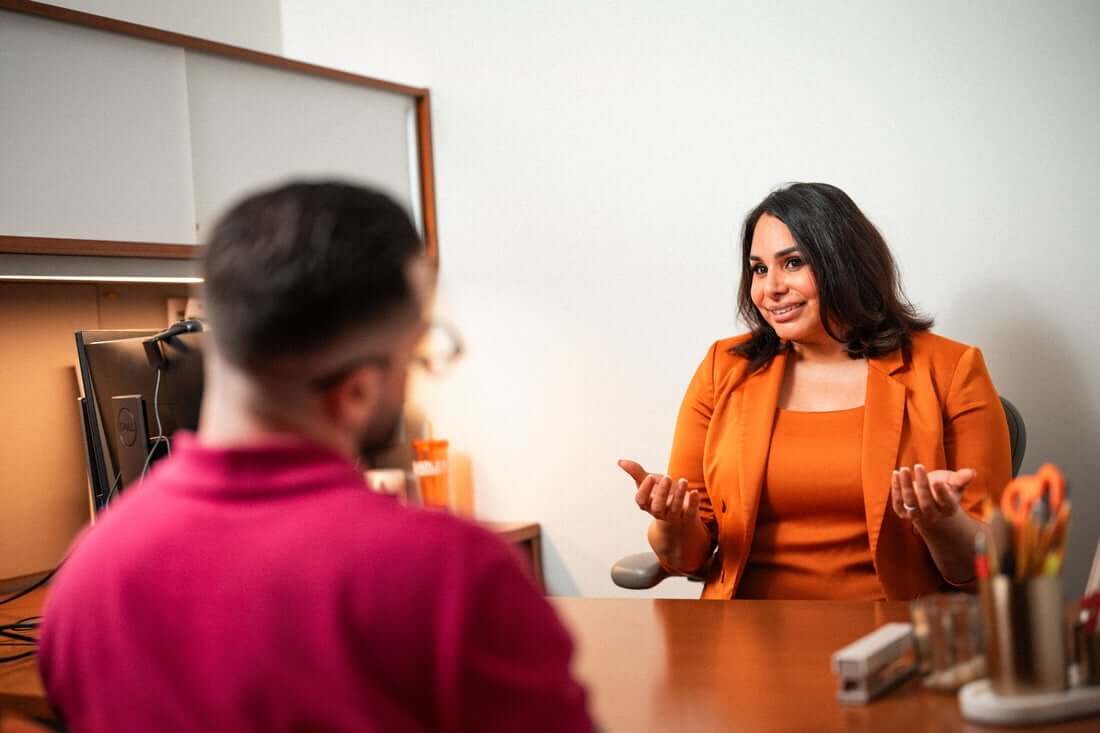
Financing your degree
Financial aid from the government, scholarships, or part-time employment can help you more easily afford your degree.
Use our tuition calculator to help you start to plan your budget.
Please make a selection using the filters above.
Art Therapy | Ph.D.
Year
1Credits
35Tuition
$35,035Fees
$3,222Total
$38,257Term
FallCredits
12Tuition
$12,012Fees
$1,074Total
$13,086Term
SpringCredits
12Tuition
$12,012Fees
$1,074Total
$13,086Term
SummerCredits
11Tuition
$11,011Fees
$1,074Total
$12,085Art Therapy | Ph.D.
Year
2Credits
18Tuition
$18,018Fees
$3,222Total
$21,240Term
FallCredits
9Tuition
$9,009Fees
$1,074Total
$10,083Term
SpringCredits
7Tuition
$7,007Fees
$1,074Total
$8,081Term
SummerCredits
2Tuition
$2,002Fees
$1,074Total
$3,076Art Therapy | Ph.D.
Year
3Credits
9Tuition
$9,009Fees
$3,222Total
$12,231Term
FallCredits
3Tuition
$3,003Fees
$1,074Total
$4,077Term
SpringCredits
3Tuition
$3,003Fees
$1,074Total
$4,077Term
SummerCredits
3Tuition
$3,003Fees
$1,074Total
$4,077Art Therapy | Ph.D.
Year
1Credits
35Tuition
$35,035Fees
$7,428Total
$42,463Term
FallCredits
12Tuition
$12,012Fees
$2,476Total
$14,488Term
SpringCredits
12Tuition
$12,012Fees
$2,476Total
$14,488Term
SummerCredits
11Tuition
$11,011Fees
$2,476Total
$13,487Art Therapy | Ph.D.
Year
2Credits
18Tuition
$18,018Fees
$7,428Total
$25,446Term
FallCredits
9Tuition
$9,009Fees
$2,476Total
$11,485Term
SpringCredits
7Tuition
$7,007Fees
$2,476Total
$9,483Term
SummerCredits
2Tuition
$2,002Fees
$2,476Total
$4,478Art Therapy | Ph.D.
Year
3Credits
9Tuition
$9,009Fees
$7,428Total
$16,437Term
FallCredits
3Tuition
$3,003Fees
$2,476Total
$5,479Term
SpringCredits
3Tuition
$3,003Fees
$2,476Total
$5,479Term
SummerCredits
3Tuition
$3,003Fees
$2,476Total
$5,4794 Year Course Sequence (on ground)
Clinical Mental Health Counseling | M.A.
Year
1Credits
18Tuition
$29,106Fees
$1,806Total
$30,912Term
FallCredits
6Tuition
$9,702Fees
$602Total
$10,304Term
SpringCredits
6Tuition
$9,702Fees
$602Total
$10,304Term
SummerCredits
6Tuition
$9,702Fees
$602Total
$10,304Clinical Mental Health Counseling | M.A.
Year
2Credits
20Tuition
$32,340Fees
$1,806Total
$34,146Term
FallCredits
7Tuition
$11,319Fees
$602Total
$11,921Term
SpringCredits
7Tuition
$11,319Fees
$602Total
$11,921Term
SummerCredits
6Tuition
$9,702Fees
$602Total
$10,304Clinical Mental Health Counseling | M.A.
Year
3Credits
18Tuition
$29,106Fees
$1,806Total
$30,912Term
FallCredits
6Tuition
$9,702Fees
$602Total
$10,304Term
SpringCredits
6Tuition
$9,702Fees
$602Total
$10,304Term
SummerCredits
6Tuition
$9,702Fees
$602Total
$10,304Clinical Mental Health Counseling | M.A.
Year
4Credits
6Tuition
$9,702Fees
$1,806Total
$11,508Term
FallCredits
2Tuition
$3,234Fees
$602Total
$3,836Term
SpringCredits
2Tuition
$3,234Fees
$602Total
$3,836Term
SummerCredits
2Tuition
$3,234Fees
$602Total
$3,8364 Year Course Sequence (on ground)
Clinical Mental Health Counseling | M.A.
Year
1Credits
18Tuition
$29,106Fees
$6,012Total
$35,118Term
FallCredits
6Tuition
$9,702Fees
$2,004Total
$11,706Term
SpringCredits
6Tuition
$9,702Fees
$2,004Total
$11,706Term
SummerCredits
6Tuition
$9,702Fees
$2,004Total
$11,706Clinical Mental Health Counseling | M.A.
Year
2Credits
20Tuition
$32,340Fees
$6,012Total
$38,352Term
FallCredits
7Tuition
$11,319Fees
$2,004Total
$13,323Term
SpringCredits
7Tuition
$11,319Fees
$2,004Total
$13,323Term
SummerCredits
6Tuition
$9,702Fees
$2,004Total
$11,706Clinical Mental Health Counseling | M.A.
Year
3Credits
18Tuition
$29,106Fees
$6,012Total
$35,118Term
FallCredits
6Tuition
$9,702Fees
$2,004Total
$11,706Term
SpringCredits
6Tuition
$9,702Fees
$2,004Total
$11,706Term
SummerCredits
6Tuition
$9,702Fees
$2,004Total
$11,706Clinical Mental Health Counseling | M.A.
Year
4Credits
6Tuition
$9,702Fees
$6,012Total
$15,714Term
FallCredits
2Tuition
$3,234Fees
$2,004Total
$5,238Term
SpringCredits
2Tuition
$3,234Fees
$2,004Total
$5,238Term
SummerCredits
2Tuition
$3,234Fees
$2,004Total
$5,2383 Year Course Sequence (on ground)
Clinical Mental Health Counseling | M.A.
Year
1Credits
24Tuition
$38,808Fees
$1,806Total
$40,614Term
FallCredits
9Tuition
$14,553Fees
$602Total
$15,155Term
SpringCredits
9Tuition
$14,553Fees
$602Total
$15,155Term
SummerCredits
6Tuition
$9,702Fees
$602Total
$10,304Clinical Mental Health Counseling | M.A.
Year
2Credits
23Tuition
$37,191Fees
$1,806Total
$38,997Term
FallCredits
7Tuition
$11,319Fees
$602Total
$11,921Term
SpringCredits
7Tuition
$11,319Fees
$602Total
$11,921Term
SummerCredits
9Tuition
$14,553Fees
$602Total
$15,155Clinical Mental Health Counseling | M.A.
Year
3Credits
18Tuition
$29,106Fees
$1,806Total
$30,912Term
FallCredits
6Tuition
$9,702Fees
$602Total
$10,304Term
SpringCredits
6Tuition
$9,702Fees
$602Total
$10,304Term
SummerCredits
6Tuition
$9,702Fees
$602Total
$10,3043 Year Course Sequence (on ground)
Clinical Mental Health Counseling | M.A.
Year
1Credits
24Tuition
$38,808Fees
$6,012Total
$44,820Term
FallCredits
9Tuition
$14,553Fees
$2,004Total
$16,557Term
SpringCredits
9Tuition
$14,553Fees
$2,004Total
$16,557Term
SummerCredits
6Tuition
$9,702Fees
$2,004Total
$11,706Clinical Mental Health Counseling | M.A.
Year
2Credits
23Tuition
$37,191Fees
$6,012Total
$43,203Term
FallCredits
7Tuition
$11,319Fees
$2,004Total
$13,323Term
SpringCredits
7Tuition
$11,319Fees
$2,004Total
$13,323Term
SummerCredits
9Tuition
$14,553Fees
$2,004Total
$16,557Clinical Mental Health Counseling | M.A.
Year
3Credits
18Tuition
$29,106Fees
$6,012Total
$35,118Term
FallCredits
6Tuition
$9,702Fees
$2,004Total
$11,706Term
SpringCredits
6Tuition
$9,702Fees
$2,004Total
$11,706Term
SummerCredits
6Tuition
$9,702Fees
$2,004Total
$11,7062 Year Course Sequence (on ground)
Clinical Mental Health Counseling | M.A.
Year
1Credits
35Tuition
$56,595Fees
$1,806Total
$58,401Term
FallCredits
13Tuition
$21,021Fees
$602Total
$21,623Term
SpringCredits
13Tuition
$21,021Fees
$602Total
$21,623Term
SummerCredits
9Tuition
$14,553Fees
$602Total
$15,155Clinical Mental Health Counseling | M.A.
Year
2Credits
27Tuition
$43,659Fees
$1,806Total
$45,465Term
FallCredits
12Tuition
$19,404Fees
$602Total
$20,006Term
SpringCredits
9Tuition
$14,553Fees
$602Total
$15,155Term
SummerCredits
6Tuition
$9,702Fees
$602Total
$10,3042 Year Course Sequence (on ground)
Clinical Mental Health Counseling | M.A.
Year
1Credits
35Tuition
$56,595Fees
$6,012Total
$62,607Term
FallCredits
13Tuition
$21,021Fees
$2,004Total
$23,025Term
SpringCredits
13Tuition
$21,021Fees
$2,004Total
$23,025Term
SummerCredits
9Tuition
$14,553Fees
$2,004Total
$16,557Clinical Mental Health Counseling | M.A.
Year
2Credits
27Tuition
$43,659Fees
$6,012Total
$49,671Term
FallCredits
12Tuition
$19,404Fees
$2,004Total
$21,408Term
SpringCredits
9Tuition
$14,553Fees
$2,004Total
$16,557Term
SummerCredits
6Tuition
$9,702Fees
$2,004Total
$11,7063 Year Course Sequence (online)
Clinical Mental Health Counseling | M.A.
Year
1Credits
29Tuition
$46,893Fees
$1,806Total
$48,699Term
FallCredits
9.5Tuition
$15,362Fees
$602Total
$15,964Term
SpringCredits
9.5Tuition
$15,362Fees
$602Total
$15,964Term
SummerCredits
10Tuition
$16,170Fees
$602Total
$16,772Clinical Mental Health Counseling | M.A.
Year
2Credits
24Tuition
$38,808Fees
$1,806Total
$40,614Term
FallCredits
6Tuition
$9,702Fees
$602Total
$10,304Term
SpringCredits
9Tuition
$14,553Fees
$602Total
$15,155Term
SummerCredits
9Tuition
$14,553Fees
$602Total
$15,155Clinical Mental Health Counseling | M.A.
Year
3Credits
9Tuition
$14,553Fees
$1,806Total
$16,359Term
FallCredits
3 or 6Tuition
$4,851Fees
$602Total
$5,453Term
SpringCredits
3Tuition
$4,851Fees
$602Total
$5,453Term
SummerCredits
3Tuition
$4,851Fees
$602Total
$5,4533 Year Course Sequence (online)
Clinical Mental Health Counseling | M.A.
Year
1Credits
29Tuition
$46,893Fees
$6,012Total
$52,905Term
FallCredits
9.5Tuition
$15,362Fees
$2,004Total
$17,366Term
SpringCredits
9.5Tuition
$15,362Fees
$2,004Total
$17,366Term
SummerCredits
10Tuition
$16,170Fees
$2,004Total
$18,174Clinical Mental Health Counseling | M.A.
Year
2Credits
24Tuition
$38,808Fees
$6,012Total
$44,820Term
FallCredits
6Tuition
$9,702Fees
$2,004Total
$11,706Term
SpringCredits
9Tuition
$14,553Fees
$2,004Total
$16,557Term
SummerCredits
9Tuition
$14,553Fees
$2,004Total
$16,557Clinical Mental Health Counseling | M.A.
Year
3Credits
9Tuition
$14,553Fees
$6,012Total
$20,565Term
FallCredits
3 or 6Tuition
$4,851Fees
$2,004Total
$6,855Term
SpringCredits
3Tuition
$4,851Fees
$2,004Total
$6,855Term
SummerCredits
3Tuition
$4,851Fees
$2,004Total
$6,8552.5 Year Course Sequence (online)
Clinical Mental Health Counseling | M.A.
Year
1Credits
29Tuition
$46,893Fees
$1,806Total
$48,699Term
FallCredits
9.5Tuition
$15,362Fees
$602Total
$15,964Term
SpringCredits
9.5Tuition
$15,362Fees
$602Total
$15,964Term
SummerCredits
10Tuition
$16,170Fees
$602Total
$16,772Clinical Mental Health Counseling | M.A.
Year
2Credits
27Tuition
$43,659Fees
$1,806Total
$45,465Term
FallCredits
9Tuition
$14,553Fees
$602Total
$15,155Term
SpringCredits
9Tuition
$14,553Fees
$602Total
$15,155Term
SummerCredits
9Tuition
$14,553Fees
$602Total
$15,155Clinical Mental Health Counseling | M.A.
Year
3Credits
6Tuition
$9,702Fees
$1,204Total
$10,906Term
FallCredits
3Tuition
$4,851Fees
$602Total
$5,453Term
SpringCredits
3Tuition
$4,851Fees
$602Total
$5,4532.5 Year Course Sequence (online)
Clinical Mental Health Counseling | M.A.
Year
1Credits
29Tuition
$46,893Fees
$6,012Total
$52,905Term
FallCredits
9.5Tuition
$15,362Fees
$2,004Total
$17,366Term
SpringCredits
9.5Tuition
$15,362Fees
$2,004Total
$17,366Term
SummerCredits
10Tuition
$16,170Fees
$2,004Total
$18,174Clinical Mental Health Counseling | M.A.
Year
2Credits
27Tuition
$43,659Fees
$6,012Total
$49,671Term
FallCredits
9Tuition
$14,553Fees
$2,004Total
$16,557Term
SpringCredits
9Tuition
$14,553Fees
$2,004Total
$16,557Term
SummerCredits
9Tuition
$14,553Fees
$2,004Total
$16,557Clinical Mental Health Counseling | M.A.
Year
3Credits
6Tuition
$9,702Fees
$4,008Total
$13,710Term
FallCredits
3Tuition
$4,851Fees
$2,004Total
$6,855Term
SpringCredits
3Tuition
$4,851Fees
$2,004Total
$6,8552 Year Course Sequence (online)
Clinical Mental Health Counseling | M.A.
Year
1Credits
38Tuition
$61,446Fees
$1,806Total
$63,252Term
FallCredits
12.5Tuition
$20,213Fees
$602Total
$20,815Term
SpringCredits
12.5Tuition
$20,213Fees
$602Total
$20,815Term
SummerCredits
13Tuition
$21,021Fees
$602Total
$21,623Clinical Mental Health Counseling | M.A.
Year
2Credits
24Tuition
$38,808Fees
$1,806Total
$40,614Term
FallCredits
9Tuition
$14,553Fees
$602Total
$15,155Term
SpringCredits
9Tuition
$14,553Fees
$602Total
$15,155Term
SummerCredits
6Tuition
$9,702Fees
$602Total
$10,3042 Year Course Sequence (online)
Clinical Mental Health Counseling | M.A.
Year
1Credits
38Tuition
$61,446Fees
$6,012Total
$67,458Term
FallCredits
12.5Tuition
$20,213Fees
$2,004Total
$22,217Term
SpringCredits
12.5Tuition
$20,213Fees
$2,004Total
$22,217Term
SummerCredits
13Tuition
$21,021Fees
$2,004Total
$23,025Clinical Mental Health Counseling | M.A.
Year
2Credits
24Tuition
$38,808Fees
$6,012Total
$44,820Term
FallCredits
9Tuition
$14,553Fees
$2,004Total
$16,557Term
SpringCredits
9Tuition
$14,553Fees
$2,004Total
$16,557Term
SummerCredits
6Tuition
$9,702Fees
$2,004Total
$11,706Clinical Psychology | Psy.D.
Year
1Credits
36Tuition
$67,644Fees
$2,400Total
$70,044Term
FallCredits
13Tuition
$24,427Fees
$800Total
$25,227Term
SpringCredits
12Tuition
$22,548Fees
$800Total
$23,348Term
SummerCredits
11Tuition
$20,669Fees
$800Total
$21,469Clinical Psychology | Psy.D.
Year
2Credits
36Tuition
$67,644Fees
$2,400Total
$70,044Term
FallCredits
13Tuition
$24,427Fees
$800Total
$25,227Term
SpringCredits
13Tuition
$24,427Fees
$800Total
$25,227Term
SummerCredits
10Tuition
$18,790Fees
$800Total
$19,590Clinical Psychology | Psy.D.
Year
3Credits
25.5Tuition
$47,915Fees
$2,400Total
$50,315Term
FallCredits
10.5Tuition
$19,730Fees
$800Total
$20,530Term
SpringCredits
7.5Tuition
$14,093Fees
$800Total
$14,893Term
SummerCredits
7.5Tuition
$14,093Fees
$800Total
$14,893Clinical Psychology | Psy.D.
Year
4Credits
16.5Tuition
$31,004Fees
$2,400Total
$33,404Term
FallCredits
8.5Tuition
$15,972Fees
$800Total
$16,772Term
SpringCredits
4.5Tuition
$8,456Fees
$800Total
$9,256Term
SummerCredits
3.5Tuition
$6,577Fees
$800Total
$7,377Clinical Psychology | Psy.D.
Year
5Credits
0Tuition
$0Fees
$2,400Total
$2,400Term
FallCredits
0Tuition
$0Fees
$800Total
$800Term
SpringCredits
0Tuition
$0Fees
$800Total
$800Term
SummerCredits
0Tuition
$0Fees
$800Total
$800Clinical Psychology | Psy.D.
Year
1Credits
36Tuition
$67,644Fees
$6,606Total
$74,250Term
FallCredits
13Tuition
$24,427Fees
$2,202Total
$26,629Term
SpringCredits
12Tuition
$22,548Fees
$2,202Total
$24,750Term
SummerCredits
11Tuition
$20,669Fees
$2,202Total
$22,871Clinical Psychology | Psy.D.
Year
2Credits
36Tuition
$67,644Fees
$6,606Total
$74,250Term
FallCredits
13Tuition
$24,427Fees
$2,202Total
$26,629Term
SpringCredits
13Tuition
$24,427Fees
$2,202Total
$26,629Term
SummerCredits
10Tuition
$18,790Fees
$2,202Total
$20,992Clinical Psychology | Psy.D.
Year
3Credits
25.5Tuition
$47,915Fees
$6,606Total
$54,521Term
FallCredits
10.5Tuition
$19,730Fees
$2,202Total
$21,932Term
SpringCredits
7.5Tuition
$14,093Fees
$2,202Total
$16,295Term
SummerCredits
7.5Tuition
$14,093Fees
$2,202Total
$16,295Clinical Psychology | Psy.D.
Year
4Credits
16.5Tuition
$31,004Fees
$6,606Total
$37,610Term
FallCredits
8.5Tuition
$15,972Fees
$2,202Total
$18,174Term
SpringCredits
4.5Tuition
$8,456Fees
$2,202Total
$10,658Term
SummerCredits
3.5Tuition
$6,577Fees
$2,202Total
$8,779Clinical Psychology | Psy.D.
Year
5Credits
0Tuition
$0Fees
$6,606Total
$6,606Term
FallCredits
0Tuition
$0Fees
$2,202Total
$2,202Term
SpringCredits
0Tuition
$0Fees
$2,202Total
$2,202Term
SummerCredits
0Tuition
$0Fees
$2,202Total
$2,202Clinical Psychology | Psy.D.
Year
1Credits
42Tuition
$56,574Fees
$2,140Total
$58,714Term
FallCredits
15Tuition
$20,205Fees
$1,060Total
$21,265Term
SpringCredits
14Tuition
$18,858Fees
$540Total
$19,398Term
SummerCredits
13Tuition
$17,511Fees
$540Total
$18,051**Student Care is a student led health care plan and rates are likely to change each year; opt out with proof of other insurance is available
Clinical Psychology | Psy.D.
Year
2Credits
24Tuition
$32,328Fees
$2,140Total
$34,468Term
FallCredits
8Tuition
$10,776Fees
$1,060Total
$11,836Term
SpringCredits
8Tuition
$10,776Fees
$540Total
$11,316Term
SummerCredits
8Tuition
$10,776Fees
$540Total
$11,316**Student Care is a student led health care plan and rates are likely to change each year; opt out with proof of other insurance is available
Clinical Psychology | Psy.D.
Year
3Credits
20Tuition
$26,940Fees
$4,834Total
$31,774Term
FallCredits
8Tuition
$10,776Fees
$1,060Total
$11,836Term
SpringCredits
9Tuition
$12,123Fees
$540Total
$12,663Term
SummerCredits
3Tuition
$4,041Fees
$3,234Total
$7,275**Student Care is a student led health care plan and rates are likely to change each year; opt out with proof of other insurance is available
Clinical Psychology | Psy.D.
Year
4Credits
18Tuition
$24,246Fees
$2,140Total
$26,386Term
FallCredits
7Tuition
$9,429Fees
$1,060Total
$10,489Term
SpringCredits
4Tuition
$5,388Fees
$540Total
$5,928Term
SummerCredits
7Tuition
$9,429Fees
$540Total
$9,969**Student Care is a student led health care plan and rates are likely to change each year; opt out with proof of other insurance is available
Clinical Psychology | Psy.D.
Year
5Credits
3Tuition
$4,041Fees
$2,140Total
$6,181Term
FallCredits
1Tuition
$1,347Fees
$1,060Total
$2,407Term
SpringCredits
1Tuition
$1,347Fees
$540Total
$1,887Term
SummerCredits
1Tuition
$1,347Fees
$540Total
$1,887**Student Care is a student led health care plan and rates are likely to change each year; opt out with proof of other insurance is available
Clinical Psychology | Psy.D.
Year
1Credits
42Tuition
$56,574Fees
$6,340Total
$62,914Term
FallCredits
15Tuition
$20,205Fees
$2,460Total
$22,665Term
SpringCredits
14Tuition
$18,858Fees
$1,940Total
$20,798Term
SummerCredits
13Tuition
$17,511Fees
$1,940Total
$19,451**Student Care is a student led health care plan and rates are likely to change each year; opt out with proof of other insurance is available
Clinical Psychology | Psy.D.
Year
2Credits
24Tuition
$32,328Fees
$6,340Total
$38,668Term
FallCredits
8Tuition
$10,776Fees
$2,460Total
$13,236Term
SpringCredits
8Tuition
$10,776Fees
$1,940Total
$12,716Term
SummerCredits
8Tuition
$10,776Fees
$1,940Total
$12,716**Student Care is a student led health care plan and rates are likely to change each year; opt out with proof of other insurance is available
Clinical Psychology | Psy.D.
Year
3Credits
20Tuition
$26,940Fees
$9,034Total
$35,974Term
FallCredits
8Tuition
$10,776Fees
$2,460Total
$13,236Term
SpringCredits
9Tuition
$12,123Fees
$1,940Total
$14,063Term
SummerCredits
3Tuition
$4,041Fees
$4,634Total
$8,675**Student Care is a student led health care plan and rates are likely to change each year; opt out with proof of other insurance is available
Clinical Psychology | Psy.D.
Year
4Credits
18Tuition
$24,246Fees
$6,340Total
$30,586Term
FallCredits
7Tuition
$9,429Fees
$2,460Total
$11,889Term
SpringCredits
4Tuition
$5,388Fees
$1,940Total
$7,328Term
SummerCredits
7Tuition
$9,429Fees
$1,940Total
$11,369**Student Care is a student led health care plan and rates are likely to change each year; opt out with proof of other insurance is available
Clinical Psychology | Psy.D.
Year
5Credits
3Tuition
$4,041Fees
$6,340Total
$10,381Term
FallCredits
1Tuition
$1,347Fees
$2,460Total
$3,807Term
SpringCredits
1Tuition
$1,347Fees
$1,940Total
$3,287Term
SummerCredits
1Tuition
$1,347Fees
$1,940Total
$3,287**Student Care is a student led health care plan and rates are likely to change each year; opt out with proof of other insurance is available
Counseling: Art Therapy | M.A.
Year
1Credits
38Tuition
$61,446Fees
$1,434Total
$62,880Term
FallCredits
14Tuition
$22,638Fees
$478Total
$23,116Term
SpringCredits
12Tuition
$19,404Fees
$478Total
$19,882Term
SummerCredits
12Tuition
$19,404Fees
$478Total
$19,882Counseling: Art Therapy | M.A.
Year
2Credits
28Tuition
$45,276Fees
$1,434Total
$46,710Term
FallCredits
12Tuition
$19,404Fees
$478Total
$19,882Term
SpringCredits
9Tuition
$14,553Fees
$478Total
$15,031Term
SummerCredits
7Tuition
$11,319Fees
$478Total
$11,797Counseling: Art Therapy | M.A.
Year
1Credits
38Tuition
$61,446Fees
$5,640Total
$67,086Term
FallCredits
14Tuition
$22,638Fees
$1,880Total
$24,518Term
SpringCredits
12Tuition
$19,404Fees
$1,880Total
$21,284Term
SummerCredits
12Tuition
$19,404Fees
$1,880Total
$21,284Counseling: Art Therapy | M.A.
Year
2Credits
28Tuition
$45,276Fees
$5,640Total
$50,916Term
FallCredits
12Tuition
$19,404Fees
$1,880Total
$21,284Term
SpringCredits
9Tuition
$14,553Fees
$1,880Total
$16,433Term
SummerCredits
7Tuition
$11,319Fees
$1,880Total
$13,199Counselling Psychology | M.A
Year
1Credits
35Tuition
$42,385Fees
$3,585Total
$45,970Term
FallCredits
14Tuition
$16,954Fees
$1,175Total
$18,129Term
SpringCredits
11Tuition
$13,321Fees
$655Total
$13,976Term
SummerCredits
10Tuition
$12,110Fees
$1,755Total
$13,865**Student Care is a student led health care plan and rates are likely to change each year; opt out with proof of other insurance is available
Counselling Psychology | M.A
Year
2Credits
24Tuition
$29,064Fees
$3,696Total
$32,760Term
FallCredits
10Tuition
$12,110Fees
$1,175Total
$13,285Term
SpringCredits
7Tuition
$8,477Fees
$655Total
$9,132Term
SummerCredits
7Tuition
$8,477Fees
$1,866Total
$10,343**Student Care is a student led health care plan and rates are likely to change each year; opt out with proof of other insurance is available
Counselling Psychology | M.A
Year
1Credits
35Tuition
$42,385Fees
$7,785Total
$50,170Term
FallCredits
14Tuition
$16,954Fees
$2,575Total
$19,529Term
SpringCredits
11Tuition
$13,321Fees
$2,055Total
$15,376Term
SummerCredits
10Tuition
$12,110Fees
$3,155Total
$15,265**Student Care is a student led health care plan and rates are likely to change each year; opt out with proof of other insurance is available
Counselling Psychology | M.A
Year
2Credits
24Tuition
$29,064Fees
$7,896Total
$36,960Term
FallCredits
10Tuition
$12,110Fees
$2,575Total
$14,685Term
SpringCredits
7Tuition
$8,477Fees
$2,055Total
$10,532Term
SummerCredits
7Tuition
$8,477Fees
$3,266Total
$11,743**Student Care is a student led health care plan and rates are likely to change each year; opt out with proof of other insurance is available
Counselling Psychology | MCP
Year
1Credits
34Tuition
$41,174Fees
$2,633Total
$43,807Term
FallCredits
14Tuition
$16,954Fees
$511Total
$17,465Term
SpringCredits
11Tuition
$13,321Fees
$511Total
$13,832Term
SummerCredits
9Tuition
$10,899Fees
$1,611Total
$12,510Counselling Psychology | MCP
Year
2Credits
21Tuition
$25,431Fees
$2,744Total
$28,175Term
FallCredits
9Tuition
$10,899Fees
$511Total
$11,410Term
SpringCredits
6Tuition
$7,266Fees
$511Total
$7,777Term
SummerCredits
6Tuition
$7,266Fees
$1,722Total
$8,988Counselling Psychology | MCP
Year
1Credits
34Tuition
$41,174Fees
$2,633Total
$43,807Term
FallCredits
14Tuition
$16,954Fees
$511Total
$17,465Term
SpringCredits
11Tuition
$13,321Fees
$511Total
$13,832Term
SummerCredits
9Tuition
$10,899Fees
$1,611Total
$12,510Counselling Psychology | MCP
Year
2Credits
21Tuition
$25,431Fees
$2,744Total
$28,175Term
FallCredits
9Tuition
$10,899Fees
$511Total
$11,410Term
SpringCredits
6Tuition
$7,266Fees
$511Total
$7,777Term
SummerCredits
6Tuition
$7,266Fees
$1,722Total
$8,988Counselling Psychology: Art Therapy | MCP:AT
Year
1Credits
34Tuition
$41,174Fees
$3,516Total
$44,690Term
FallCredits
11Tuition
$13,321Fees
$1,152Total
$14,473Term
SpringCredits
14Tuition
$16,954Fees
$632Total
$17,586Term
SummerCredits
9Tuition
$10,899Fees
$1,732Total
$12,631**Student Care is a student led health care plan and rates are likely to change each year; opt out with proof of other insurance is available
Counselling Psychology: Art Therapy | MCP:AT
Year
2Credits
26Tuition
$31,486Fees
$3,627Total
$35,113Term
FallCredits
12Tuition
$14,532Fees
$1,152Total
$15,684Term
SpringCredits
12Tuition
$14,532Fees
$632Total
$15,164Term
SummerCredits
2Tuition
$2,422Fees
$1,843Total
$4,265**Student Care is a student led health care plan and rates are likely to change each year; opt out with proof of other insurance is available
Counselling Psychology: Art Therapy | MCP:AT
Year
1Credits
34Tuition
$41,174Fees
$7,716Total
$48,890Term
FallCredits
11Tuition
$13,321Fees
$2,552Total
$15,873Term
SpringCredits
14Tuition
$16,954Fees
$2,032Total
$18,986Term
SummerCredits
9Tuition
$10,899Fees
$3,132Total
$14,031**Student Care is a student led health care plan and rates are likely to change each year; opt out with proof of other insurance is available
Counselling Psychology: Art Therapy | MCP:AT
Year
2Credits
26Tuition
$31,486Fees
$7,827Total
$39,313Term
FallCredits
12Tuition
$14,532Fees
$2,552Total
$17,084Term
SpringCredits
12Tuition
$14,532Fees
$2,032Total
$16,564Term
SummerCredits
2Tuition
$2,422Fees
$3,243Total
$5,665**Student Care is a student led health care plan and rates are likely to change each year; opt out with proof of other insurance is available
Counselling Psychology: School and Youth | M.A.
Year
1Credits
41Tuition
$49,651Fees
$3,585Total
$53,236Term
FallCredits
14Tuition
$16,954Fees
$1,175Total
$18,129Term
SpringCredits
14Tuition
$16,954Fees
$655Total
$17,609Term
SummerCredits
13Tuition
$15,743Fees
$1,755Total
$17,498**Student Care is a student led health care plan and rates are likely to change each year; opt out with proof of other insurance is available
Counselling Psychology: School and Youth | M.A.
Year
2Credits
18Tuition
$21,798Fees
$3,696Total
$25,494Term
FallCredits
4Tuition
$4,844Fees
$1,175Total
$6,019Term
SpringCredits
4Tuition
$4,844Fees
$655Total
$5,499Term
SummerCredits
10Tuition
$12,110Fees
$1,866Total
$13,976**Student Care is a student led health care plan and rates are likely to change each year; opt out with proof of other insurance is available
Counselling Psychology: School and Youth | M.A.
Year
1Credits
41Tuition
$49,651Fees
$7,785Total
$57,436Term
FallCredits
14Tuition
$16,954Fees
$2,575Total
$19,529Term
SpringCredits
14Tuition
$16,954Fees
$2,055Total
$19,009Term
SummerCredits
13Tuition
$15,743Fees
$3,155Total
$18,898**Student Care is a student led health care plan and rates are likely to change each year; opt out with proof of other insurance is available
Counselling Psychology: School and Youth | M.A.
Year
2Credits
18Tuition
$21,798Fees
$7,896Total
$29,694Term
FallCredits
4Tuition
$4,844Fees
$2,575Total
$7,419Term
SpringCredits
4Tuition
$4,844Fees
$2,055Total
$6,899Term
SummerCredits
10Tuition
$12,110Fees
$3,266Total
$15,376**Student Care is a student led health care plan and rates are likely to change each year; opt out with proof of other insurance is available
Counselling Psychology: School and Youth | MCP:SY
Year
1Credits
41Tuition
$49,651Fees
$3,585Total
$53,236Term
FallCredits
14Tuition
$16,954Fees
$1,175Total
$18,129Term
SpringCredits
14Tuition
$16,954Fees
$655Total
$17,609Term
SummerCredits
13Tuition
$15,743Fees
$1,755Total
$17,498**Student Care is a student led health care plan and rates are likely to change each year; opt out with proof of other insurance is available
Counselling Psychology: School and Youth | MCP:SY
Year
2Credits
18Tuition
$21,798Fees
$3,696Total
$25,494Term
FallCredits
4Tuition
$4,844Fees
$1,175Total
$6,019Term
SpringCredits
4Tuition
$4,844Fees
$655Total
$5,499Term
SummerCredits
10Tuition
$12,110Fees
$1,866Total
$13,976**Student Care is a student led health care plan and rates are likely to change each year; opt out with proof of other insurance is available
Counselling Psychology: School and Youth | MCP:SY
Year
1Credits
41Tuition
$49,651Fees
$7,785Total
$57,436Term
FallCredits
14Tuition
$16,954Fees
$2,575Total
$19,529Term
SpringCredits
14Tuition
$16,954Fees
$2,055Total
$19,009Term
SummerCredits
13Tuition
$15,743Fees
$3,155Total
$18,898**Student Care is a student led health care plan and rates are likely to change each year; opt out with proof of other insurance is available
Counselling Psychology: School and Youth | MCP:SY
Year
2Credits
18Tuition
$21,798Fees
$7,896Total
$29,694Term
FallCredits
4Tuition
$4,844Fees
$2,575Total
$7,419Term
SpringCredits
4Tuition
$4,844Fees
$2,055Total
$6,899Term
SummerCredits
10Tuition
$12,110Fees
$3,266Total
$15,376**Student Care is a student led health care plan and rates are likely to change each year; opt out with proof of other insurance is available
Counselor Education + Supervision | Ph.D.
Year
1Credits
27Tuition
$49,005Fees
$1,686Total
$50,691Term
FallCredits
10Tuition
$18,150Fees
$562Total
$18,712Term
SpringCredits
9Tuition
$16,335Fees
$562Total
$16,897Term
SummerCredits
8Tuition
$14,520Fees
$562Total
$15,082Counselor Education + Supervision | Ph.D.
Year
2Credits
19Tuition
$34,485Fees
$1,686Total
$36,171Term
FallCredits
10Tuition
$18,150Fees
$562Total
$18,712Term
SpringCredits
7Tuition
$12,705Fees
$562Total
$13,267Term
SummerCredits
2Tuition
$3,630Fees
$562Total
$4,192Counselor Education + Supervision | Ph.D.
Year
3Credits
14Tuition
$25,410Fees
$1,686Total
$27,096Term
FallCredits
6Tuition
$10,890Fees
$562Total
$11,452Term
SpringCredits
6Tuition
$10,890Fees
$562Total
$11,452Term
SummerCredits
2Tuition
$3,630Fees
$562Total
$4,192Counselor Education + Supervision | Ph.D.
Year
1Credits
27Tuition
$49,005Fees
$5,892Total
$54,897Term
FallCredits
10Tuition
$18,150Fees
$1,964Total
$20,114Term
SpringCredits
9Tuition
$16,335Fees
$1,964Total
$18,299Term
SummerCredits
8Tuition
$14,520Fees
$1,964Total
$16,484Counselor Education + Supervision | Ph.D.
Year
2Credits
19Tuition
$34,485Fees
$5,892Total
$40,377Term
FallCredits
10Tuition
$18,150Fees
$1,964Total
$20,114Term
SpringCredits
7Tuition
$12,705Fees
$1,964Total
$14,669Term
SummerCredits
2Tuition
$3,630Fees
$1,964Total
$5,594Counselor Education + Supervision | Ph.D.
Year
3Credits
14Tuition
$25,410Fees
$5,892Total
$31,302Term
FallCredits
6Tuition
$10,890Fees
$1,964Total
$12,854Term
SpringCredits
6Tuition
$10,890Fees
$1,964Total
$12,854Term
SummerCredits
2Tuition
$3,630Fees
$1,964Total
$5,594Couple + Family Therapy | M.A.
Year
1Credits
30Tuition
$48,510Fees
$1,536Total
$50,046Term
FallCredits
11Tuition
$17,787Fees
$512Total
$18,299Term
SpringCredits
12Tuition
$19,404Fees
$512Total
$19,916Term
SummerCredits
7Tuition
$11,319Fees
$512Total
$11,831Couple + Family Therapy | M.A.
Year
2Credits
27Tuition
$43,659Fees
$1,536Total
$45,195Term
FallCredits
12Tuition
$19,404Fees
$512Total
$19,916Term
SpringCredits
11Tuition
$17,787Fees
$512Total
$18,299Term
SummerCredits
4Tuition
$6,468Fees
$512Total
$6,980Couple + Family Therapy | M.A.
Year
1Credits
30Tuition
$48,510Fees
$5,742Total
$54,252Term
FallCredits
11Tuition
$17,787Fees
$1,914Total
$19,701Term
SpringCredits
12Tuition
$19,404Fees
$1,914Total
$21,318Term
SummerCredits
7Tuition
$11,319Fees
$1,914Total
$13,233Couple + Family Therapy | M.A.
Year
2Credits
27Tuition
$43,659Fees
$5,742Total
$49,401Term
FallCredits
12Tuition
$19,404Fees
$1,914Total
$21,318Term
SpringCredits
11Tuition
$17,787Fees
$1,914Total
$19,701Term
SummerCredits
4Tuition
$6,468Fees
$1,914Total
$8,382Couple + Family Therapy | Ph.D.
Year
1Credits
21Tuition
$38,115Fees
$1,686Total
$39,801Term
FallCredits
7Tuition
$12,705Fees
$562Total
$13,267Term
SpringCredits
10Tuition
$18,150Fees
$562Total
$18,712Term
SummerCredits
4Tuition
$7,260Fees
$562Total
$7,822Couple + Family Therapy | Ph.D.
Year
2Credits
27Tuition
$49,005Fees
$1,686Total
$50,691Term
FallCredits
9Tuition
$16,335Fees
$562Total
$16,897Term
SpringCredits
12Tuition
$21,780Fees
$562Total
$22,342Term
SummerCredits
6Tuition
$10,890Fees
$562Total
$11,452Couple + Family Therapy | Ph.D.
Year
3Credits
3Tuition
$5,445Fees
$1,686Total
$7,131Term
FallCredits
1Tuition
$1,815Fees
$562Total
$2,377Term
SpringCredits
1Tuition
$1,815Fees
$562Total
$2,377Term
SummerCredits
1Tuition
$1,815Fees
$562Total
$2,377Couple + Family Therapy | Ph.D.
Year
4Credits
3Tuition
$5,445Fees
$1,686Total
$7,131Term
FallCredits
1Tuition
$1,815Fees
$562Total
$2,377Term
SpringCredits
1Tuition
$1,815Fees
$562Total
$2,377Term
SummerCredits
1Tuition
$1,815Fees
$562Total
$2,377Couple + Family Therapy | Ph.D.
Year
1Credits
21Tuition
$38,115Fees
$5,892Total
$44,007Term
FallCredits
7Tuition
$12,705Fees
$1,964Total
$14,669Term
SpringCredits
10Tuition
$18,150Fees
$1,964Total
$20,114Term
SummerCredits
4Tuition
$7,260Fees
$1,964Total
$9,224Couple + Family Therapy | Ph.D.
Year
2Credits
27Tuition
$49,005Fees
$5,892Total
$54,897Term
FallCredits
9Tuition
$16,335Fees
$1,964Total
$18,299Term
SpringCredits
12Tuition
$21,780Fees
$1,964Total
$23,744Term
SummerCredits
6Tuition
$10,890Fees
$1,964Total
$12,854Couple + Family Therapy | Ph.D.
Year
3Credits
3Tuition
$5,445Fees
$5,892Total
$11,337Term
FallCredits
1Tuition
$1,815Fees
$1,964Total
$3,779Term
SpringCredits
1Tuition
$1,815Fees
$1,964Total
$3,779Term
SummerCredits
1Tuition
$1,815Fees
$1,964Total
$3,779Couple + Family Therapy | Ph.D.
Year
4Credits
3Tuition
$5,445Fees
$5,892Total
$11,337Term
FallCredits
1Tuition
$1,815Fees
$1,964Total
$3,779Term
SpringCredits
1Tuition
$1,815Fees
$1,964Total
$3,779Term
SummerCredits
1Tuition
$1,815Fees
$1,964Total
$3,779Forensic Mental Health Leadership | M.A.
Year
1Credits
36Tuition
$58,212Fees
$1,536Total
$59,748Term
FallCredits
13Tuition
$21,021Fees
$512Total
$21,533Term
SpringCredits
13Tuition
$21,021Fees
$512Total
$21,533Term
SummerCredits
10Tuition
$16,170Fees
$512Total
$16,682Forensic Mental Health Leadership | M.A.
Year
2Credits
4.5Tuition
$7,277Fees
$512Total
$7,789Term
FallCredits
4.5Tuition
$7,277Fees
$512Total
$7,789Forensic Mental Health Leadership | M.A.
Year
1Credits
36Tuition
$58,212Fees
$5,742Total
$63,954Term
FallCredits
13Tuition
$21,021Fees
$1,914Total
$22,935Term
SpringCredits
13Tuition
$21,021Fees
$1,914Total
$22,935Term
SummerCredits
10Tuition
$16,170Fees
$1,914Total
$18,084Forensic Mental Health Leadership | M.A.
Year
2Credits
4.5Tuition
$7,277Fees
$1,914Total
$9,191Term
FallCredits
4.5Tuition
$7,277Fees
$1,914Total
$9,191Industrial + Organizational Psychology | M.A.
Year
1Credits
21Tuition
$21,021Fees
$3,222Total
$24,243Term
FallCredits
7Tuition
$7,007Fees
$1,074Total
$8,081Term
SpringCredits
7Tuition
$7,007Fees
$1,074Total
$8,081Term
SummerCredits
7Tuition
$7,007Fees
$1,074Total
$8,081Industrial + Organizational Psychology | M.A.
Year
2Credits
15Tuition
$15,015Fees
$3,222Total
$18,237Term
FallCredits
6Tuition
$6,006Fees
$1,074Total
$7,080Term
SpringCredits
6Tuition
$6,006Fees
$1,074Total
$7,080Term
SummerCredits
3Tuition
$3,003Fees
$1,074Total
$4,077Industrial + Organizational Psychology | M.A.
Year
1Credits
21Tuition
$21,021Fees
$7,428Total
$28,449Term
FallCredits
7Tuition
$7,007Fees
$2,476Total
$9,483Term
SpringCredits
7Tuition
$7,007Fees
$2,476Total
$9,483Term
SummerCredits
7Tuition
$7,007Fees
$2,476Total
$9,483Industrial + Organizational Psychology | M.A.
Year
2Credits
15Tuition
$15,015Fees
$7,428Total
$22,443Term
FallCredits
6Tuition
$6,006Fees
$2,476Total
$8,482Term
SpringCredits
6Tuition
$6,006Fees
$2,476Total
$8,482Term
SummerCredits
3Tuition
$3,003Fees
$2,476Total
$5,479Industrial + Organizational Psychology | M.A.
Year
1Credits
27Tuition
$32,697Fees
$1,890Total
$34,587Term
FallCredits
10Tuition
$12,110Fees
$630Total
$12,740Term
SpringCredits
10Tuition
$12,110Fees
$630Total
$12,740Term
SummerCredits
7Tuition
$8,477Fees
$630Total
$9,107Industrial + Organizational Psychology | M.A.
Year
2Credits
11Tuition
$13,321Fees
$1,890Total
$15,211Term
FallCredits
5Tuition
$6,055Fees
$630Total
$6,685Term
SpringCredits
5Tuition
$6,055Fees
$630Total
$6,685Term
SummerCredits
1Tuition
$1,211Fees
$630Total
$1,841Industrial + Organizational Psychology | M.A.
Year
1Credits
27Tuition
$32,697Fees
$6,090Total
$38,787Term
FallCredits
10Tuition
$12,110Fees
$2,030Total
$14,140Term
SpringCredits
10Tuition
$12,110Fees
$2,030Total
$14,140Term
SummerCredits
7Tuition
$8,477Fees
$2,030Total
$10,507Industrial + Organizational Psychology | M.A.
Year
2Credits
11Tuition
$13,321Fees
$6,090Total
$19,411Term
FallCredits
5Tuition
$6,055Fees
$2,030Total
$8,085Term
SpringCredits
5Tuition
$6,055Fees
$2,030Total
$8,085Term
SummerCredits
1Tuition
$1,211Fees
$2,030Total
$3,241Industrial + Organizational Psychology | MIOP
Year
1Credits
27Tuition
$32,697Fees
$2,410Total
$35,107Term
FallCredits
10Tuition
$12,110Fees
$1,150Total
$13,260Term
SpringCredits
10Tuition
$12,110Fees
$630Total
$12,740Term
SummerCredits
7Tuition
$8,477Fees
$630Total
$9,107**Student Care is a student led health care plan and rates are likely to change each year; opt out with proof of other insurance is available
Industrial + Organizational Psychology | MIOP
Year
2Credits
11Tuition
$13,321Fees
$2,410Total
$15,731Term
FallCredits
5Tuition
$6,055Fees
$1,150Total
$7,205Term
SpringCredits
5Tuition
$6,055Fees
$630Total
$6,685Term
SummerCredits
1Tuition
$1,211Fees
$630Total
$1,841**Student Care is a student led health care plan and rates are likely to change each year; opt out with proof of other insurance is available
Industrial + Organizational Psychology | MIOP
Year
1Credits
27Tuition
$32,697Fees
$6,610Total
$39,307Term
FallCredits
10Tuition
$12,110Fees
$2,550Total
$14,660Term
SpringCredits
10Tuition
$12,110Fees
$2,030Total
$14,140Term
SummerCredits
7Tuition
$8,477Fees
$2,030Total
$10,507**Student Care is a student led health care plan and rates are likely to change each year; opt out with proof of other insurance is available
Industrial + Organizational Psychology | MIOP
Year
2Credits
11Tuition
$13,321Fees
$6,610Total
$19,931Term
FallCredits
5Tuition
$6,055Fees
$2,550Total
$8,605Term
SpringCredits
5Tuition
$6,055Fees
$2,030Total
$8,085Term
SummerCredits
1Tuition
$1,211Fees
$2,030Total
$3,241**Student Care is a student led health care plan and rates are likely to change each year; opt out with proof of other insurance is available
Industrial + Organizational Psychology | Ph.D.
Year
1Credits
21Tuition
$21,021Fees
$3,222Total
$24,243Term
FallCredits
7Tuition
$7,007Fees
$1,074Total
$8,081Term
SpringCredits
7Tuition
$7,007Fees
$1,074Total
$8,081Term
SummerCredits
7Tuition
$7,007Fees
$1,074Total
$8,081Industrial + Organizational Psychology | Ph.D.
Year
2Credits
21Tuition
$21,021Fees
$3,222Total
$24,243Term
FallCredits
7Tuition
$7,007Fees
$1,074Total
$8,081Term
SpringCredits
7Tuition
$7,007Fees
$1,074Total
$8,081Term
SummerCredits
7Tuition
$7,007Fees
$1,074Total
$8,081Industrial + Organizational Psychology | Ph.D.
Year
3Credits
19.5Tuition
$19,520Fees
$3,222Total
$22,742Term
FallCredits
6.5Tuition
$6,507Fees
$1,074Total
$7,581Term
SpringCredits
6.5Tuition
$6,507Fees
$1,074Total
$7,581Term
SummerCredits
6.5Tuition
$6,507Fees
$1,074Total
$7,581Industrial + Organizational Psychology | Ph.D.
Year
4Credits
4.5Tuition
$4,505Fees
$3,222Total
$7,727Term
FallCredits
1.5Tuition
$1,502Fees
$1,074Total
$2,576Term
SpringCredits
1.5Tuition
$1,502Fees
$1,074Total
$2,576Term
SummerCredits
1.5Tuition
$1,502Fees
$1,074Total
$2,576Industrial + Organizational Psychology | Ph.D.
Year
1Credits
21Tuition
$21,021Fees
$7,428Total
$28,449Term
FallCredits
7Tuition
$7,007Fees
$2,476Total
$9,483Term
SpringCredits
7Tuition
$7,007Fees
$2,476Total
$9,483Term
SummerCredits
7Tuition
$7,007Fees
$2,476Total
$9,483Industrial + Organizational Psychology | Ph.D.
Year
2Credits
21Tuition
$21,021Fees
$7,428Total
$28,449Term
FallCredits
7Tuition
$7,007Fees
$2,476Total
$9,483Term
SpringCredits
7Tuition
$7,007Fees
$2,476Total
$9,483Term
SummerCredits
7Tuition
$7,007Fees
$2,476Total
$9,483Industrial + Organizational Psychology | Ph.D.
Year
3Credits
19.5Tuition
$19,520Fees
$7,428Total
$26,948Term
FallCredits
6.5Tuition
$6,507Fees
$2,476Total
$8,983Term
SpringCredits
6.5Tuition
$6,507Fees
$2,476Total
$8,983Term
SummerCredits
6.5Tuition
$6,507Fees
$2,476Total
$8,983Industrial + Organizational Psychology | Ph.D.
Year
4Credits
4.5Tuition
$4,505Fees
$7,428Total
$11,933Term
FallCredits
1.5Tuition
$1,502Fees
$2,476Total
$3,978Term
SpringCredits
1.5Tuition
$1,502Fees
$2,476Total
$3,978Term
SummerCredits
1.5Tuition
$1,502Fees
$2,476Total
$3,978Military Psychology | M.A.
Year
1Credits
21Tuition
$21,021Fees
$3,222Total
$24,243Term
FallCredits
7Tuition
$7,007Fees
$1,074Total
$8,081Term
SpringCredits
7Tuition
$7,007Fees
$1,074Total
$8,081Term
SummerCredits
7Tuition
$7,007Fees
$1,074Total
$8,081Military Psychology | M.A.
Year
2Credits
15Tuition
$15,015Fees
$3,222Total
$18,237Term
FallCredits
6Tuition
$6,006Fees
$1,074Total
$7,080Term
SpringCredits
6Tuition
$6,006Fees
$1,074Total
$7,080Term
SummerCredits
3Tuition
$3,003Fees
$1,074Total
$4,077Military Psychology | M.A.
Year
1Credits
21Tuition
$21,021Fees
$7,428Total
$28,449Term
FallCredits
7Tuition
$7,007Fees
$2,476Total
$9,483Term
SpringCredits
7Tuition
$7,007Fees
$2,476Total
$9,483Term
SummerCredits
7Tuition
$7,007Fees
$2,476Total
$9,483Military Psychology | M.A.
Year
2Credits
15Tuition
$15,015Fees
$7,428Total
$22,443Term
FallCredits
6Tuition
$6,006Fees
$2,476Total
$8,482Term
SpringCredits
6Tuition
$6,006Fees
$2,476Total
$8,482Term
SummerCredits
3Tuition
$3,003Fees
$2,476Total
$5,479Organizational Leadership | M.A.
Year
1Credits
21Tuition
$21,021Fees
$3,222Total
$24,243Term
FallCredits
7Tuition
$7,007Fees
$1,074Total
$8,081Term
SpringCredits
7Tuition
$7,007Fees
$1,074Total
$8,081Term
SummerCredits
7Tuition
$7,007Fees
$1,074Total
$8,081Organizational Leadership | M.A.
Year
2Credits
15Tuition
$15,015Fees
$3,222Total
$18,237Term
FallCredits
6Tuition
$6,006Fees
$1,074Total
$7,080Term
SpringCredits
6Tuition
$6,006Fees
$1,074Total
$7,080Term
SummerCredits
3Tuition
$3,003Fees
$1,074Total
$4,077Organizational Leadership | M.A.
Year
1Credits
21Tuition
$21,021Fees
$7,428Total
$28,449Term
FallCredits
7Tuition
$7,007Fees
$2,476Total
$9,483Term
SpringCredits
7Tuition
$7,007Fees
$2,476Total
$9,483Term
SummerCredits
7Tuition
$7,007Fees
$2,476Total
$9,483Organizational Leadership | M.A.
Year
2Credits
15Tuition
$15,015Fees
$7,428Total
$22,443Term
FallCredits
6Tuition
$6,006Fees
$2,476Total
$8,482Term
SpringCredits
6Tuition
$6,006Fees
$2,476Total
$8,482Term
SummerCredits
3Tuition
$3,003Fees
$2,476Total
$5,479Organizational Leadership | Ph.D.
Year
1Credits
21Tuition
$21,021Fees
$3,222Total
$24,243Term
FallCredits
7Tuition
$7,007Fees
$1,074Total
$8,081Term
SpringCredits
7Tuition
$7,007Fees
$1,074Total
$8,081Term
SummerCredits
7Tuition
$7,007Fees
$1,074Total
$8,081Organizational Leadership | Ph.D.
Year
2Credits
22.5Tuition
$22,523Fees
$3,222Total
$25,745Term
FallCredits
7.5Tuition
$7,508Fees
$1,074Total
$8,582Term
SpringCredits
7.5Tuition
$7,508Fees
$1,074Total
$8,582Term
SummerCredits
7.5Tuition
$7,508Fees
$1,074Total
$8,582Organizational Leadership | Ph.D.
Year
3Credits
22.5Tuition
$22,523Fees
$3,222Total
$25,745Term
FallCredits
7.5Tuition
$7,508Fees
$1,074Total
$8,582Term
SpringCredits
7.5Tuition
$7,508Fees
$1,074Total
$8,582Term
SummerCredits
7.5Tuition
$7,508Fees
$1,074Total
$8,582Organizational Leadership | Ph.D.
Year
1Credits
21Tuition
$21,021Fees
$7,428Total
$28,449Term
FallCredits
7Tuition
$7,007Fees
$2,476Total
$9,483Term
SpringCredits
7Tuition
$7,007Fees
$2,476Total
$9,483Term
SummerCredits
7Tuition
$7,007Fees
$2,476Total
$9,483Organizational Leadership | Ph.D.
Year
2Credits
22.5Tuition
$22,523Fees
$7,428Total
$29,951Term
FallCredits
7.5Tuition
$7,508Fees
$2,476Total
$9,984Term
SpringCredits
7.5Tuition
$7,508Fees
$2,476Total
$9,984Term
SummerCredits
7.5Tuition
$7,508Fees
$2,476Total
$9,984Organizational Leadership | Ph.D.
Year
3Credits
22.5Tuition
$22,523Fees
$7,428Total
$29,951Term
FallCredits
7.5Tuition
$7,508Fees
$2,476Total
$9,984Term
SpringCredits
7.5Tuition
$7,508Fees
$2,476Total
$9,984Term
SummerCredits
7.5Tuition
$7,508Fees
$2,476Total
$9,984Psychology | M.A.
Year
1Credits
21Tuition
$21,021Fees
$3,222Total
$24,243Term
FallCredits
7Tuition
$7,007Fees
$1,074Total
$8,081Term
SpringCredits
7Tuition
$7,007Fees
$1,074Total
$8,081Term
SummerCredits
7Tuition
$7,007Fees
$1,074Total
$8,081Psychology | M.A.
Year
2Credits
15Tuition
$15,015Fees
$3,222Total
$18,237Term
FallCredits
6Tuition
$6,006Fees
$1,074Total
$7,080Term
SpringCredits
6Tuition
$6,006Fees
$1,074Total
$7,080Term
SummerCredits
3Tuition
$3,003Fees
$1,074Total
$4,077Psychology | M.A.
Year
1Credits
21Tuition
$21,021Fees
$7,428Total
$28,449Term
FallCredits
7Tuition
$7,007Fees
$2,476Total
$9,483Term
SpringCredits
7Tuition
$7,007Fees
$2,476Total
$9,483Term
SummerCredits
7Tuition
$7,007Fees
$2,476Total
$9,483Psychology | M.A.
Year
2Credits
15Tuition
$15,015Fees
$7,428Total
$22,443Term
FallCredits
6Tuition
$6,006Fees
$2,476Total
$8,482Term
SpringCredits
6Tuition
$6,006Fees
$2,476Total
$8,482Term
SummerCredits
3Tuition
$3,003Fees
$2,476Total
$5,479Psychology: Health + Wellness | M.Psych
Year
1Credits
21Tuition
$25,431Fees
$1,867Total
$27,298Term
FallCredits
7Tuition
$8,477Fees
$969Total
$9,446Term
SpringCredits
7Tuition
$8,477Fees
$449Total
$8,926Term
SummerCredits
7Tuition
$8,477Fees
$449Total
$8,926**Student Care is a student led health care plan and rates are likely to change each year; opt out with proof of other insurance is available
Psychology: Health + Wellness | M.Psych
Year
2Credits
15Tuition
$18,165Fees
$1,867Total
$20,032Term
FallCredits
5Tuition
$6,055Fees
$969Total
$7,024Term
SpringCredits
4Tuition
$4,844Fees
$449Total
$5,293Term
SummerCredits
6Tuition
$7,266Fees
$449Total
$7,715**Student Care is a student led health care plan and rates are likely to change each year; opt out with proof of other insurance is available
Psychology: Health + Wellness | M.Psych
Year
1Credits
21Tuition
$25,431Fees
$6,067Total
$31,498Term
FallCredits
7Tuition
$8,477Fees
$2,369Total
$10,846Term
SpringCredits
7Tuition
$8,477Fees
$1,849Total
$10,326Term
SummerCredits
7Tuition
$8,477Fees
$1,849Total
$10,326**Student Care is a student led health care plan and rates are likely to change each year; opt out with proof of other insurance is available
Psychology: Health + Wellness | M.Psych
Year
2Credits
15Tuition
$18,165Fees
$6,067Total
$24,232Term
FallCredits
5Tuition
$6,055Fees
$2,369Total
$8,424Term
SpringCredits
4Tuition
$4,844Fees
$1,849Total
$6,693Term
SummerCredits
6Tuition
$7,266Fees
$1,849Total
$9,115**Student Care is a student led health care plan and rates are likely to change each year; opt out with proof of other insurance is available
Sex Therapy | CERT
Year
1Credits
10Tuition
$10,300Fees
$666Total
$10,966Term
FallCredits
4Tuition
$4,120Fees
$222Total
$4,342Term
SpringCredits
3Tuition
$3,090Fees
$222Total
$3,312Term
SummerCredits
3Tuition
$3,090Fees
$222Total
$3,312Sex Therapy | CERT
Year
1Credits
10Tuition
$10,300Fees
$4,872Total
$15,172Term
FallCredits
4Tuition
$4,120Fees
$1,624Total
$5,744Term
SpringCredits
3Tuition
$3,090Fees
$1,624Total
$4,714Term
SummerCredits
3Tuition
$3,090Fees
$1,624Total
$4,714Sport + Human Performance | M.S.
Year
1Credits
23Tuition
$37,191Fees
$624Total
$37,815Term
FallCredits
10Tuition
$16,170Fees
$208Total
$16,378Term
SpringCredits
10Tuition
$16,170Fees
$208Total
$16,378Term
SummerCredits
3Tuition
$4,851Fees
$208Total
$5,059Sport + Human Performance | M.S.
Year
2Credits
15Tuition
$24,255Fees
$624Total
$24,879Term
FallCredits
9Tuition
$14,553Fees
$208Total
$14,761Term
SpringCredits
4Tuition
$6,468Fees
$208Total
$6,676Term
SummerCredits
2Tuition
$3,234Fees
$208Total
$3,442Sport + Human Performance | M.S.
Year
1Credits
23Tuition
$37,191Fees
$4,830Total
$42,021Term
FallCredits
10Tuition
$16,170Fees
$1,610Total
$17,780Term
SpringCredits
10Tuition
$16,170Fees
$1,610Total
$17,780Term
SummerCredits
3Tuition
$4,851Fees
$1,610Total
$6,461Sport + Human Performance | M.S.
Year
2Credits
15Tuition
$24,255Fees
$4,830Total
$29,085Term
FallCredits
9Tuition
$14,553Fees
$1,610Total
$16,163Term
SpringCredits
4Tuition
$6,468Fees
$1,610Total
$8,078Term
SummerCredits
2Tuition
$3,234Fees
$1,610Total
$4,844
The latest from our
students, faculty, and alumni
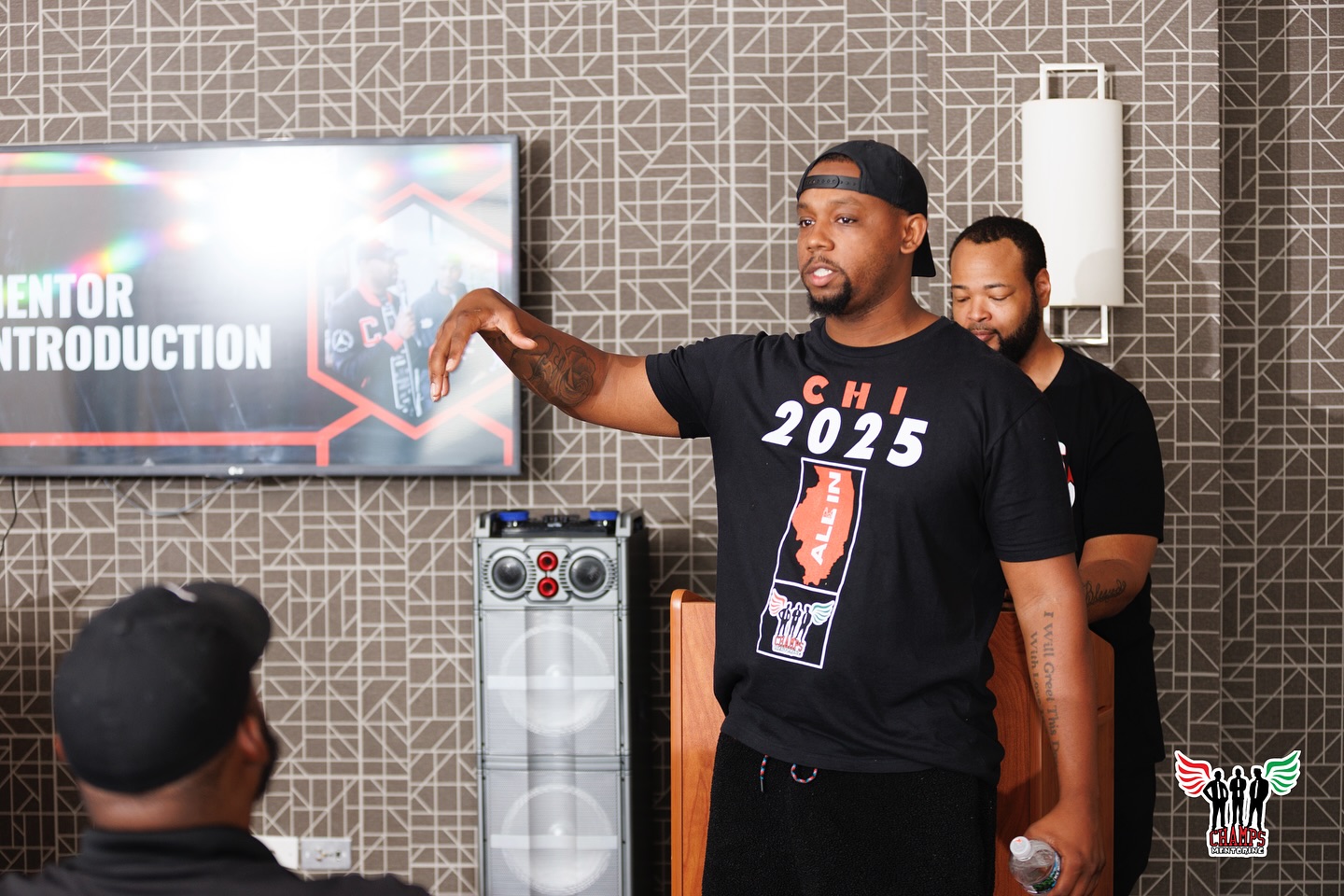
The power of showing up: Adler alum transforms lives through mentorship
The young men in Aaron Williams’ mentorship group know they can count on him to show up. Week after week. Conversation after conversation.

Endometriosis afflicts millions of women, but few people feel comfortable talking about it
Health care providers often dismiss endometriosis pain as ‘all in your head’ − which can delay a correct diagnosis and treatment for years.
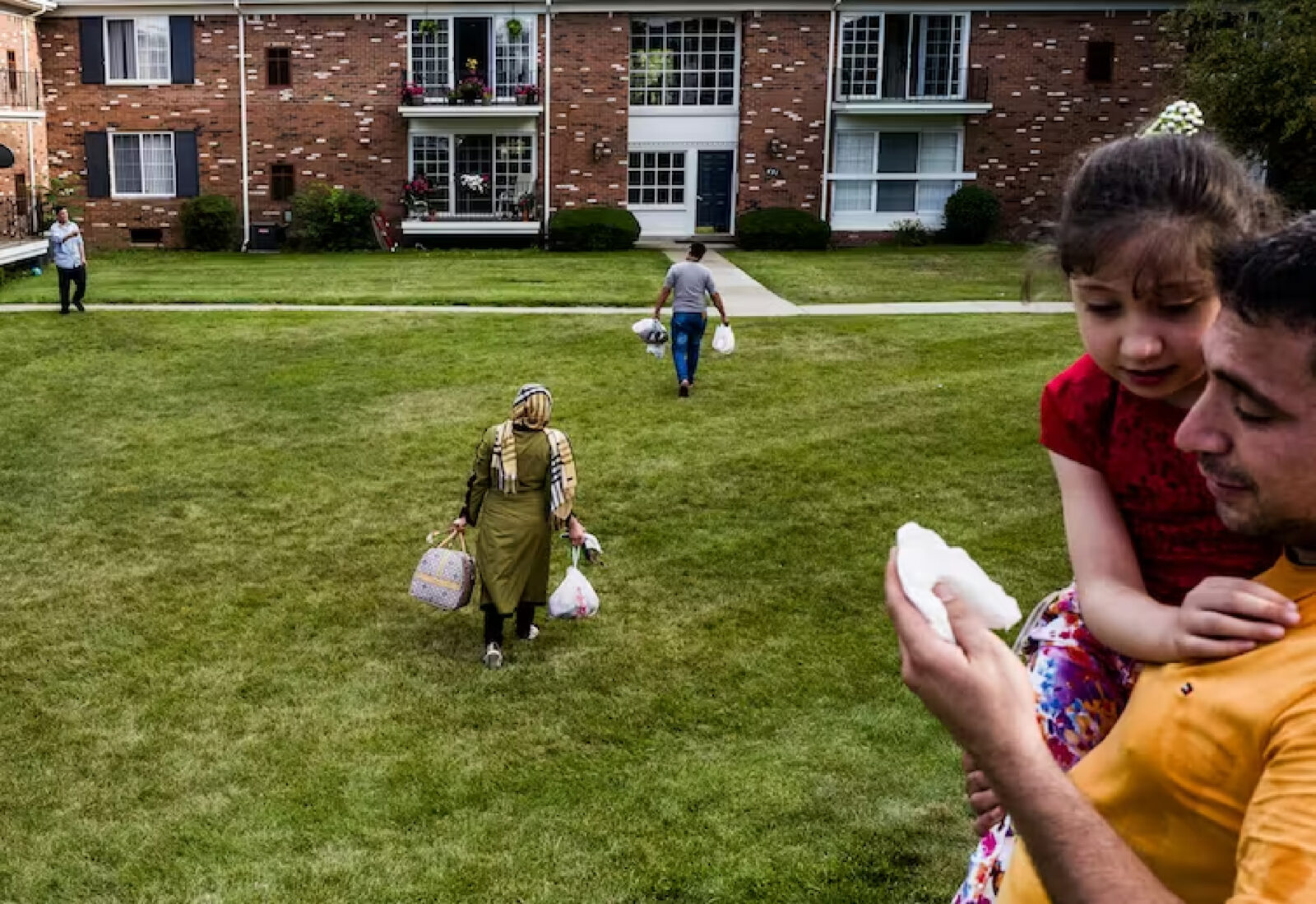
3 myths about immigration in America
The US is home to more international migrants than any other country. But even though immigration is an actively debated topic, immigrants are poorly understood.
Still wondering?
Do you want to know more about Adler University before applying? Learn more about the University, explore programs, view admissions requirements, and review available scholarships.
